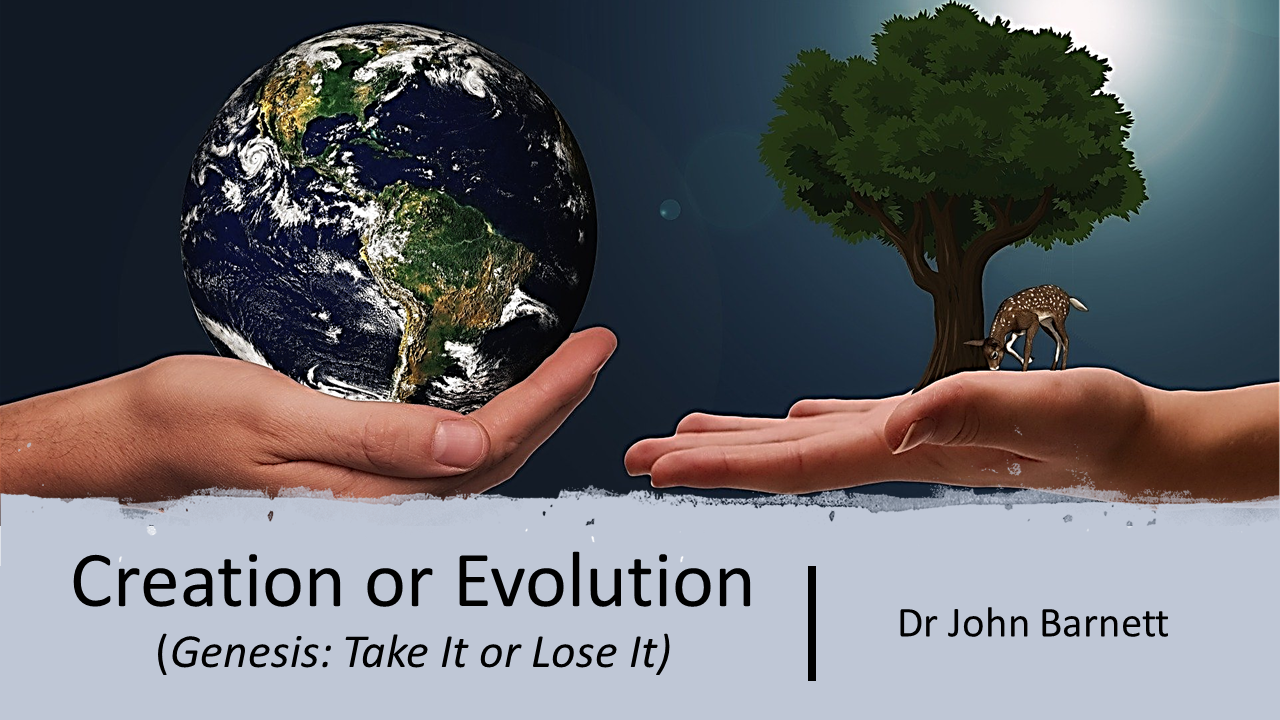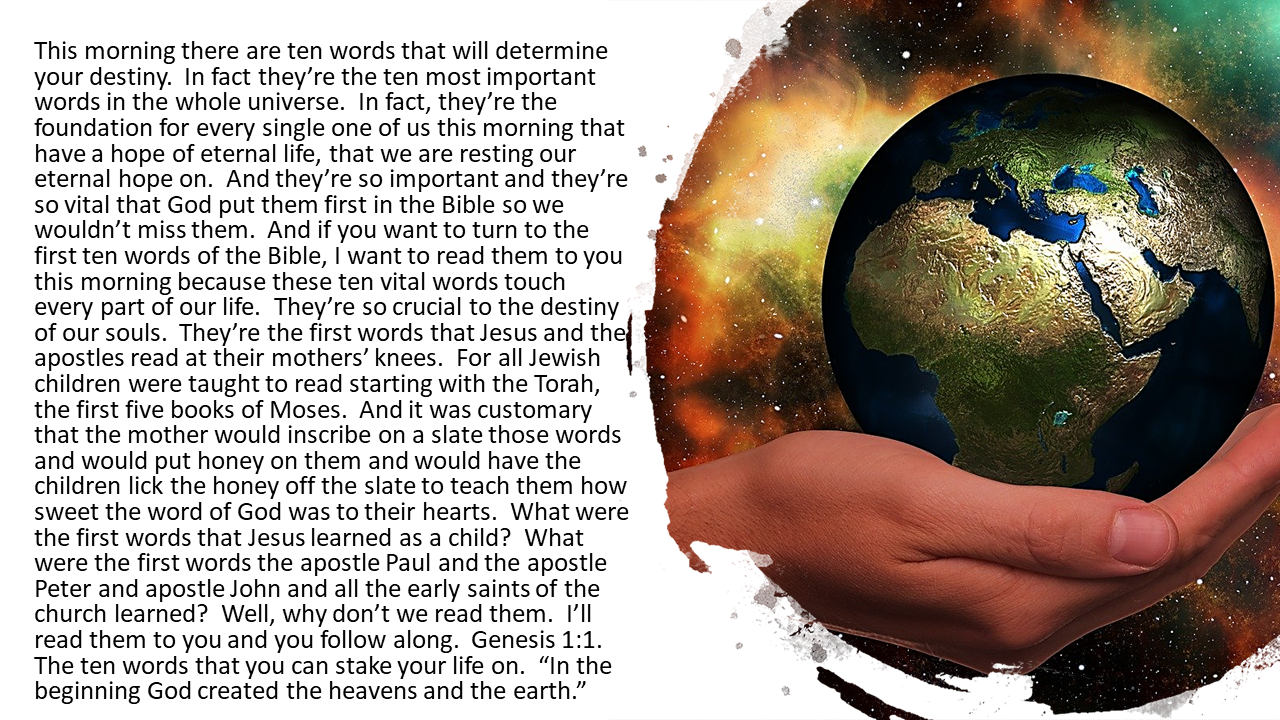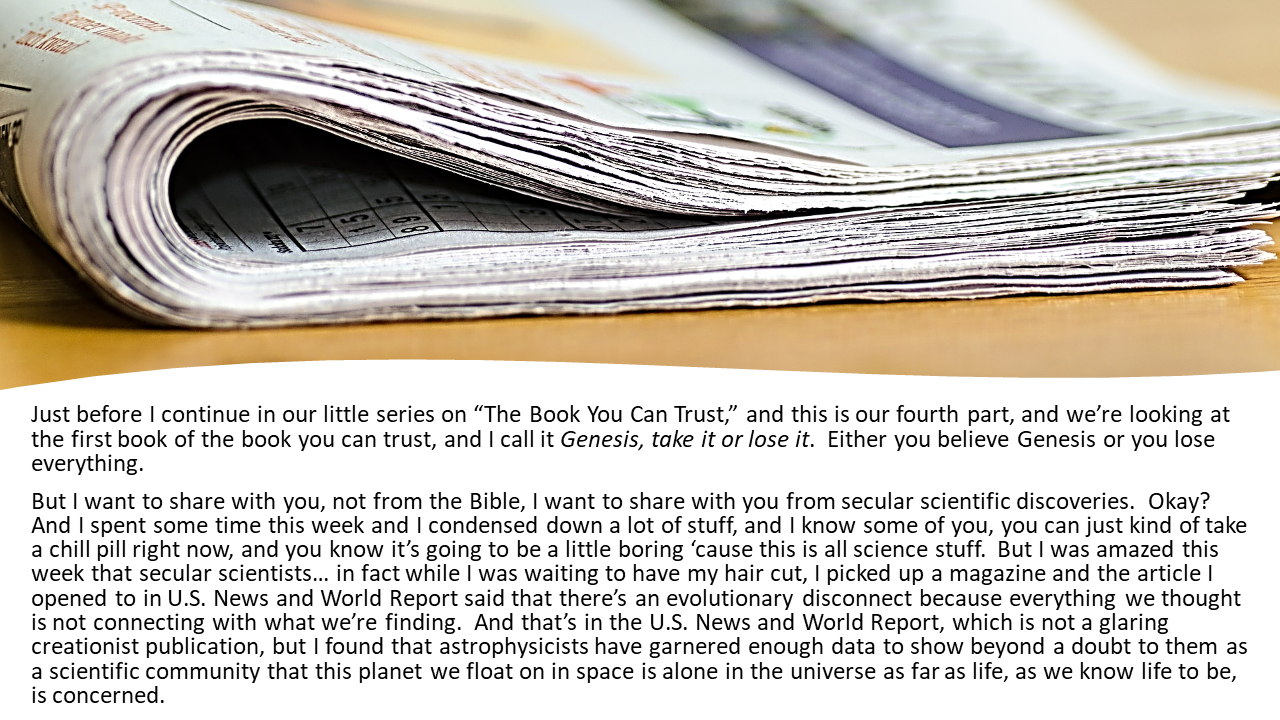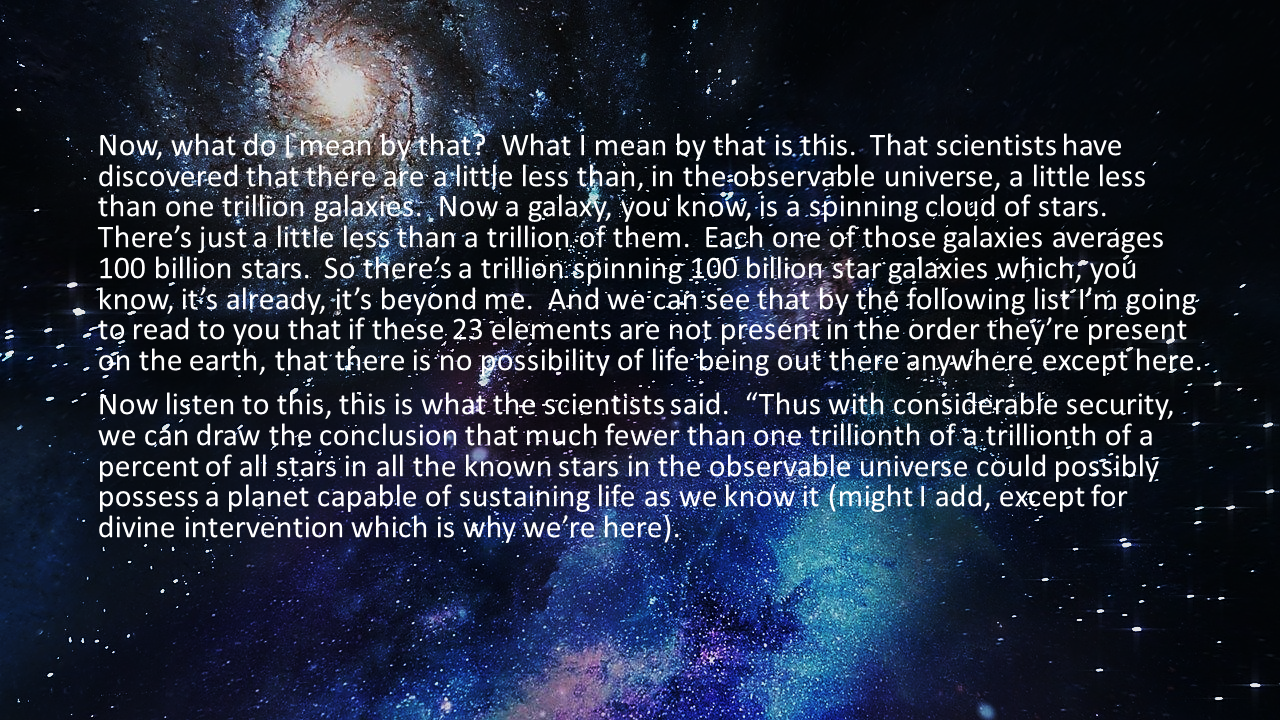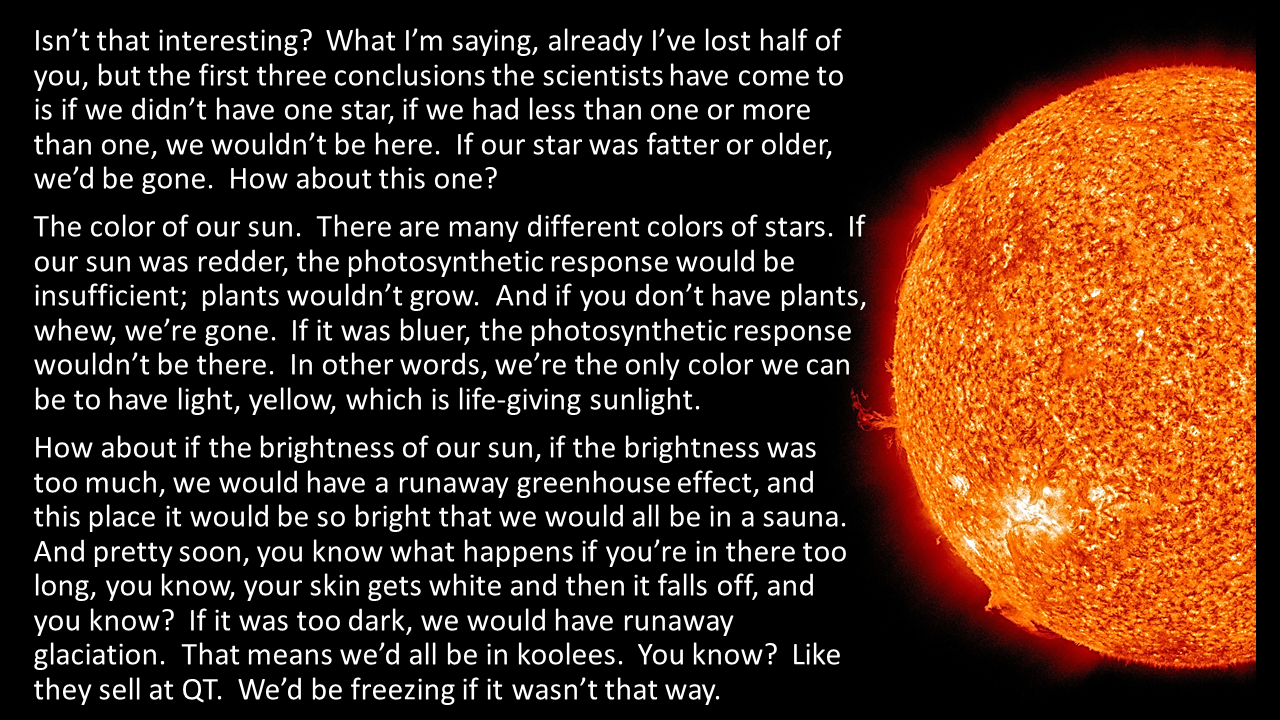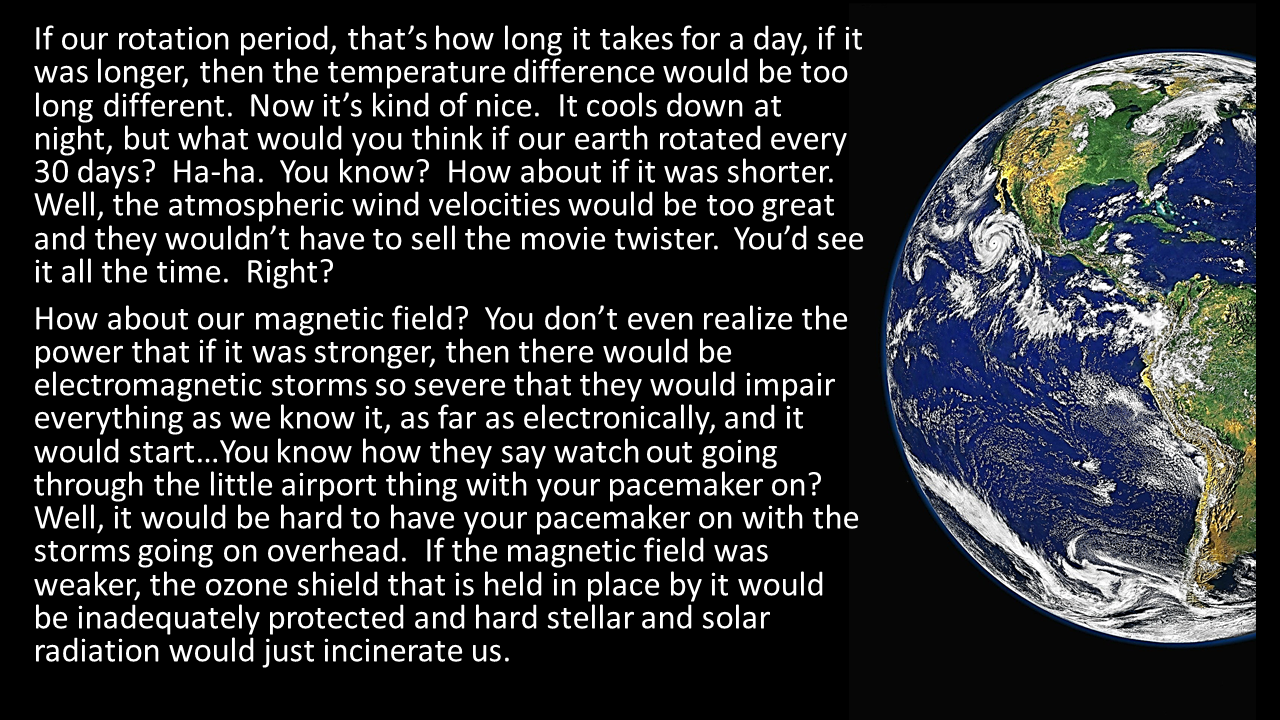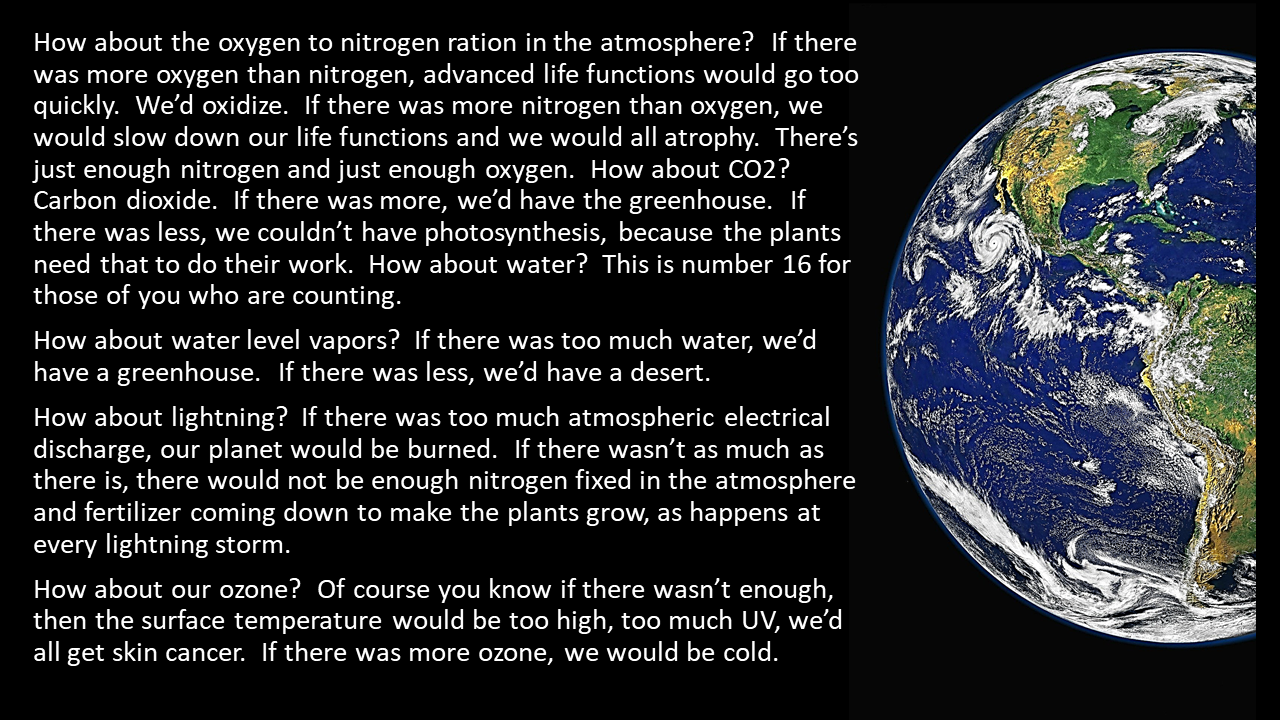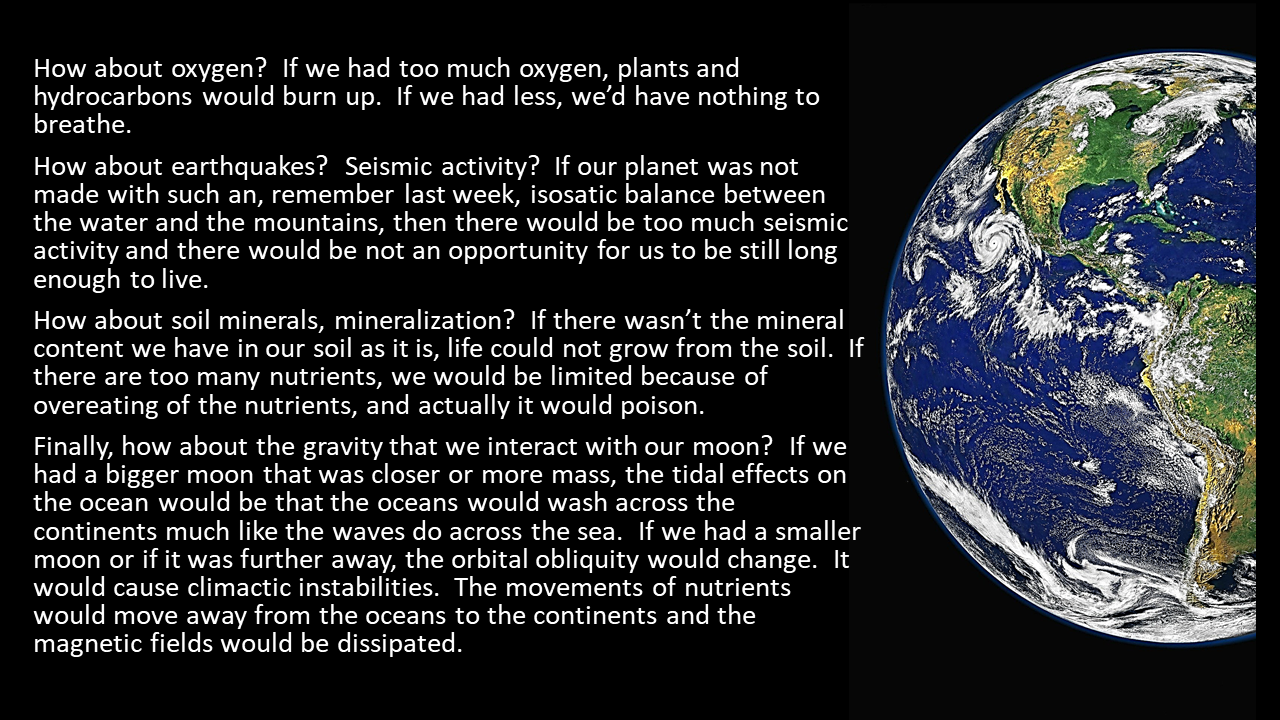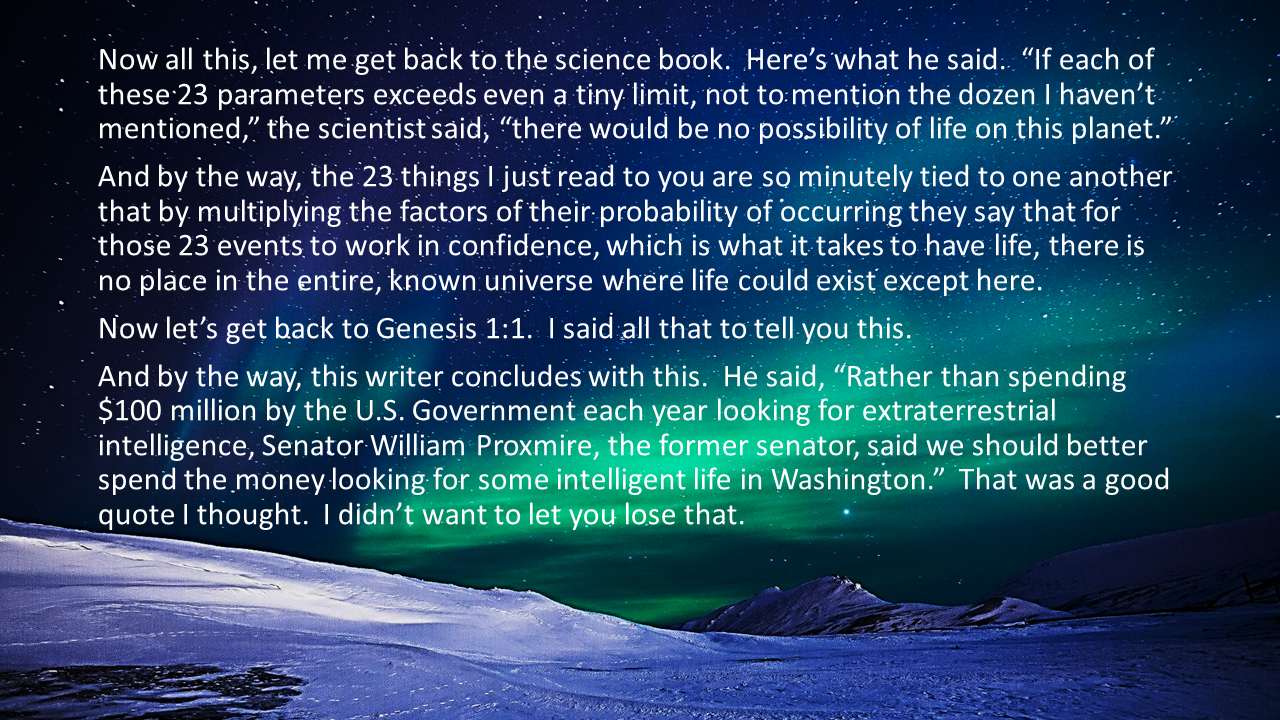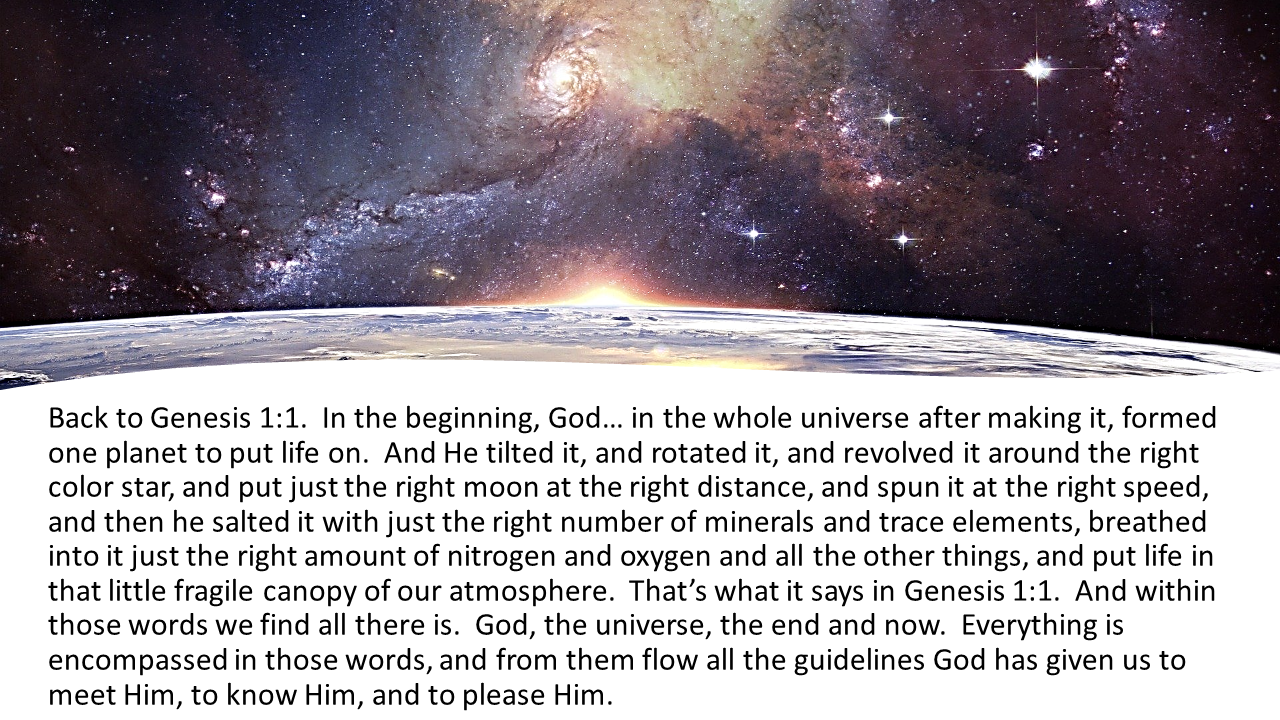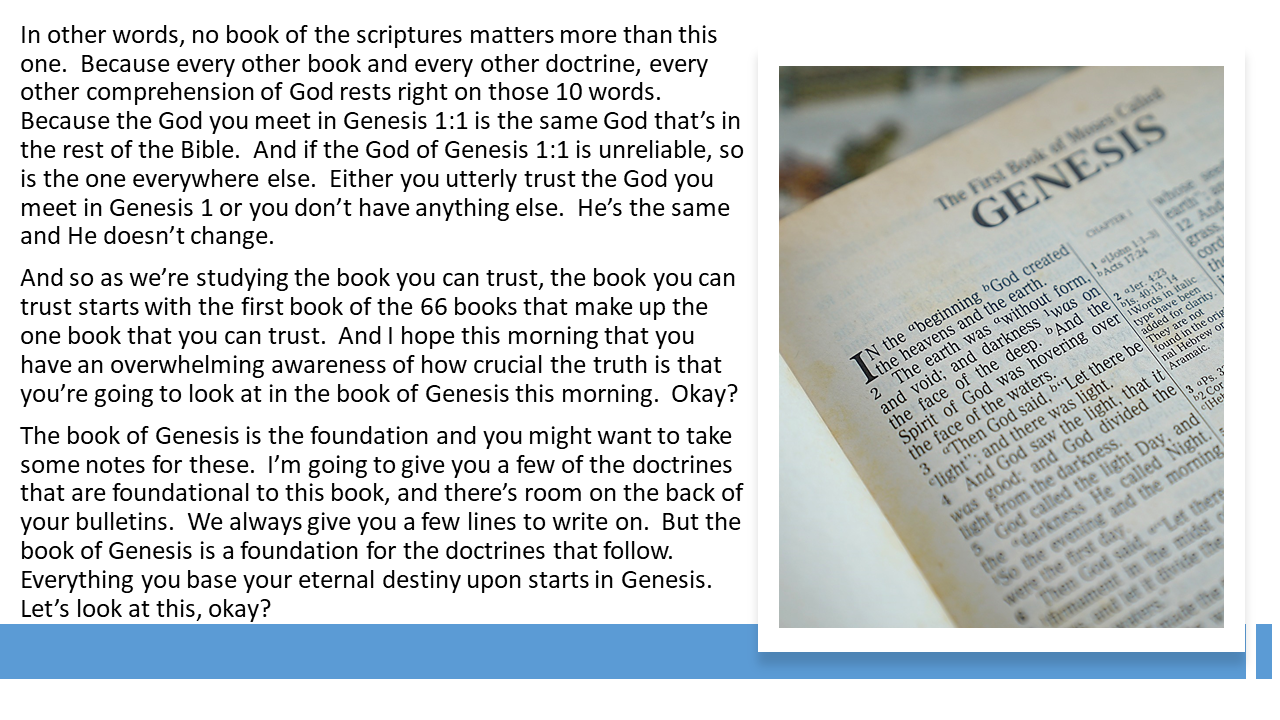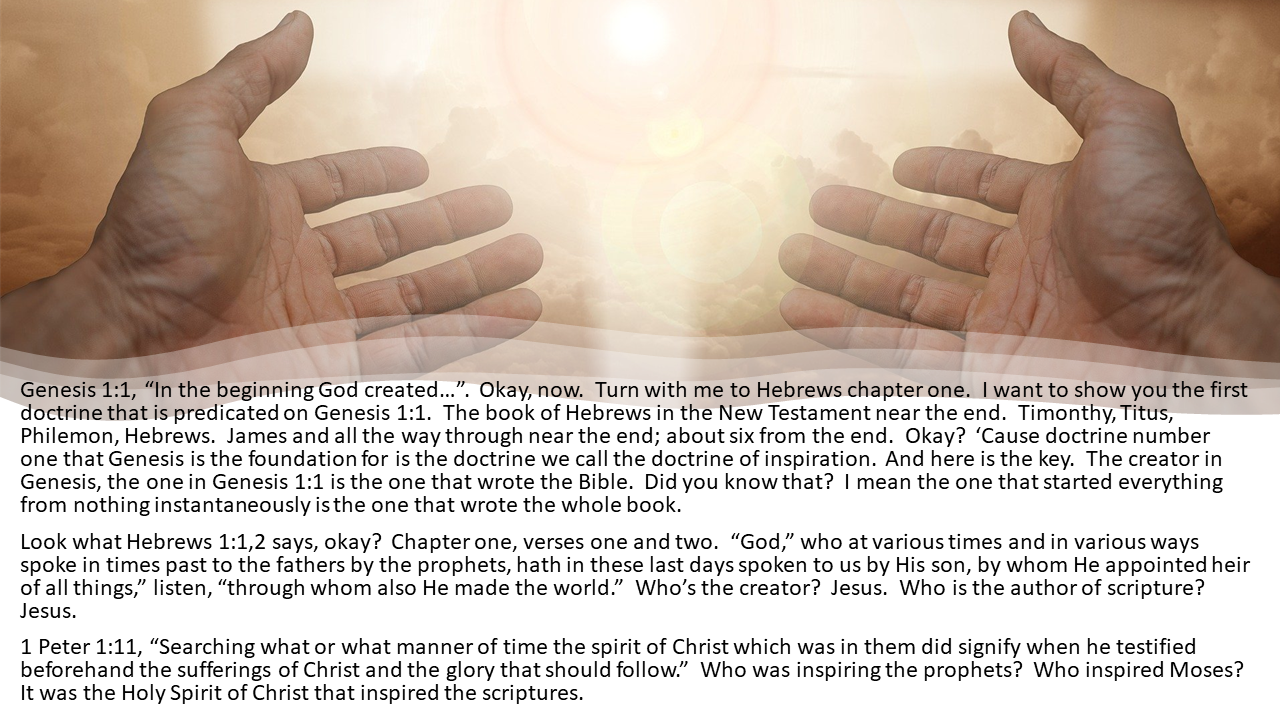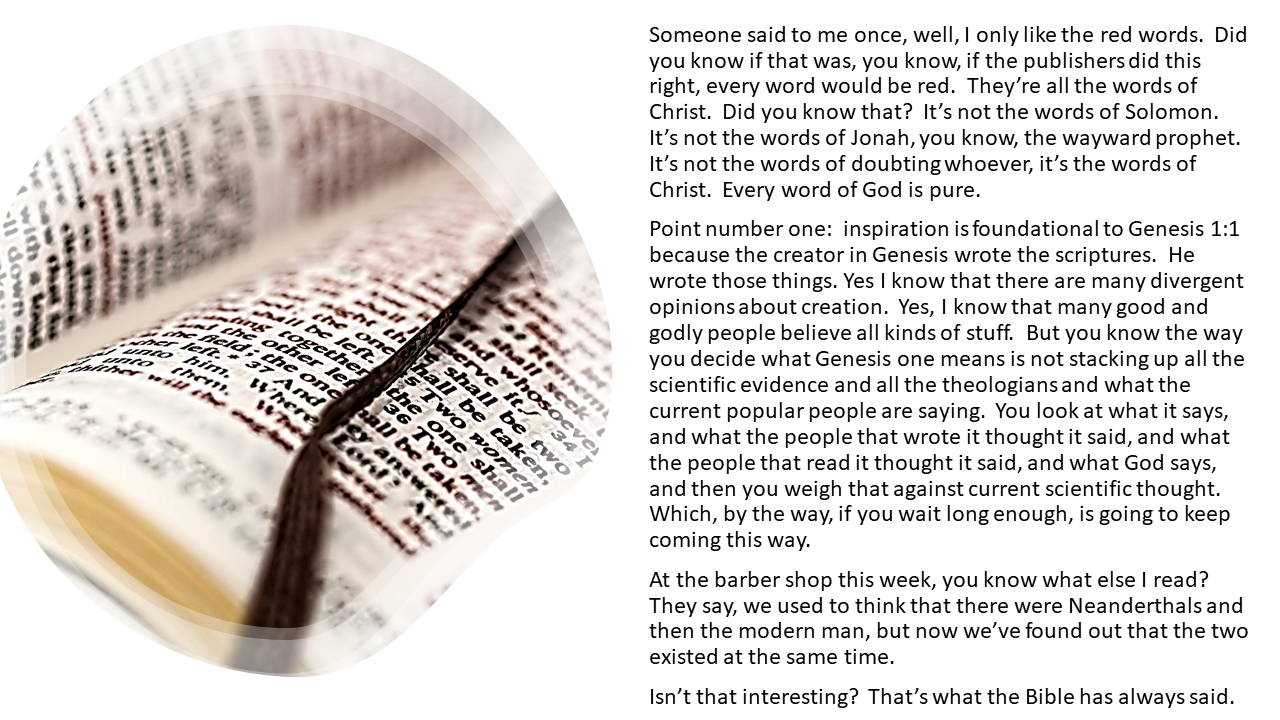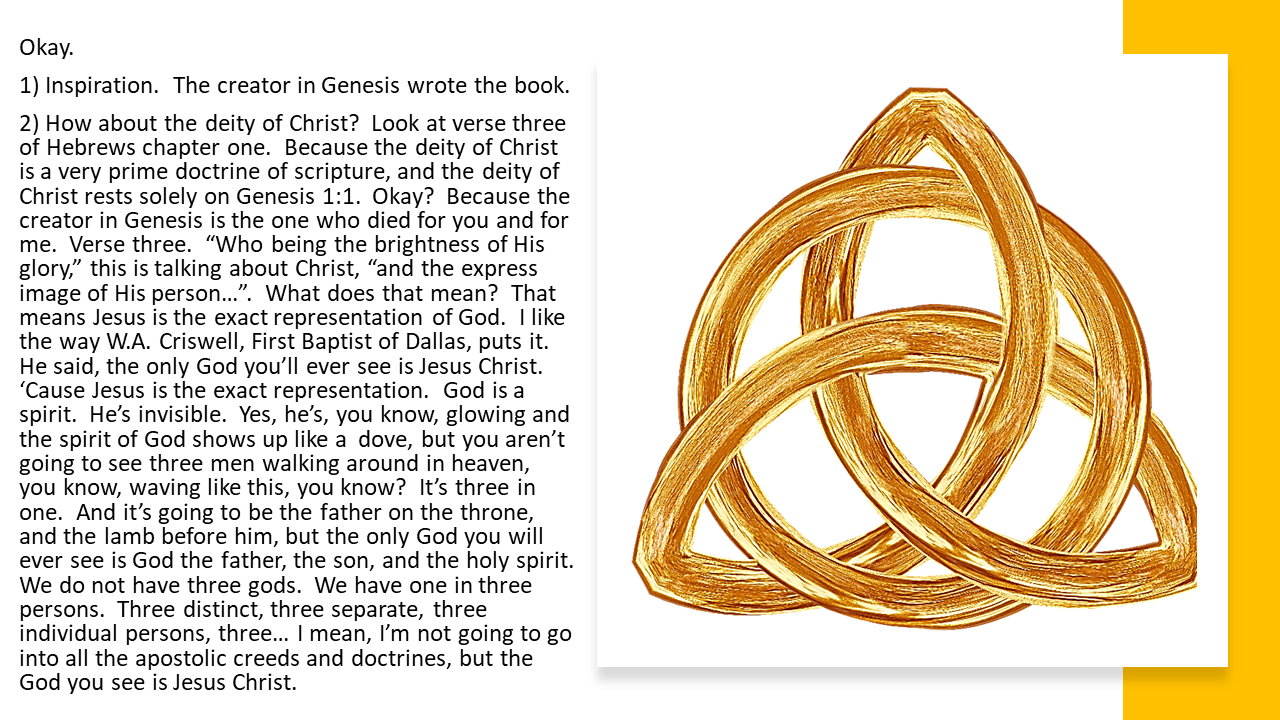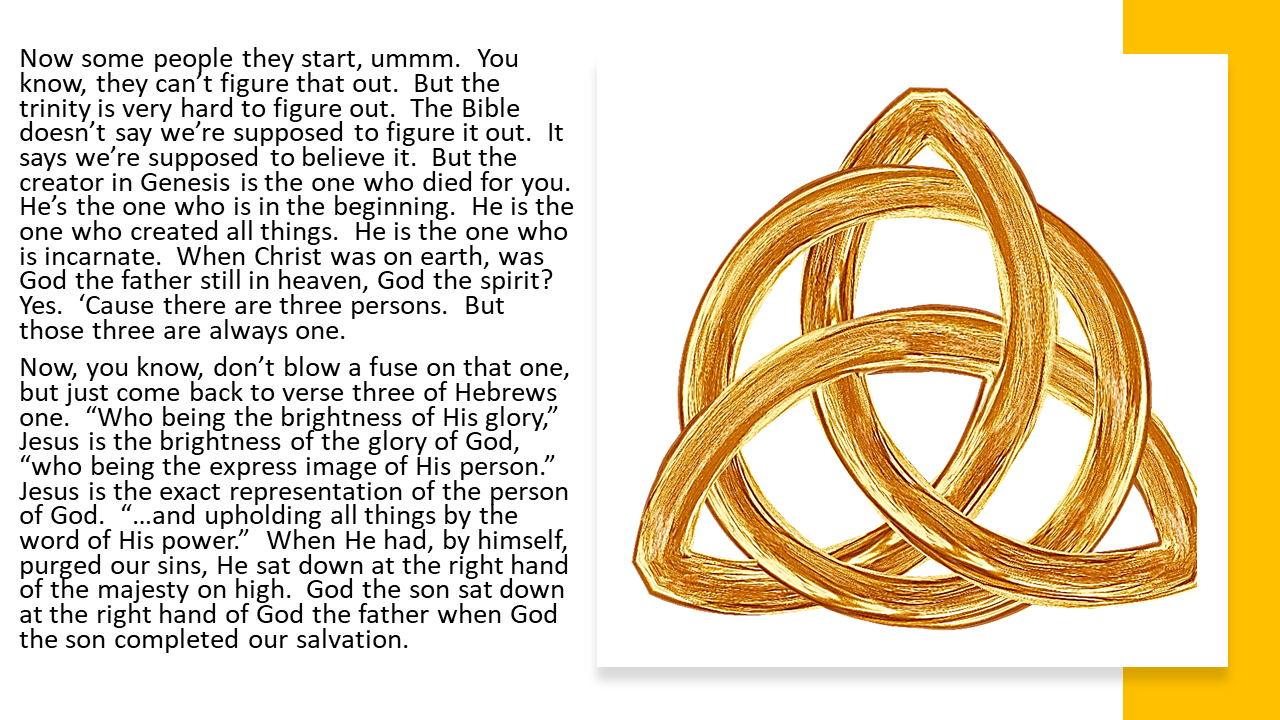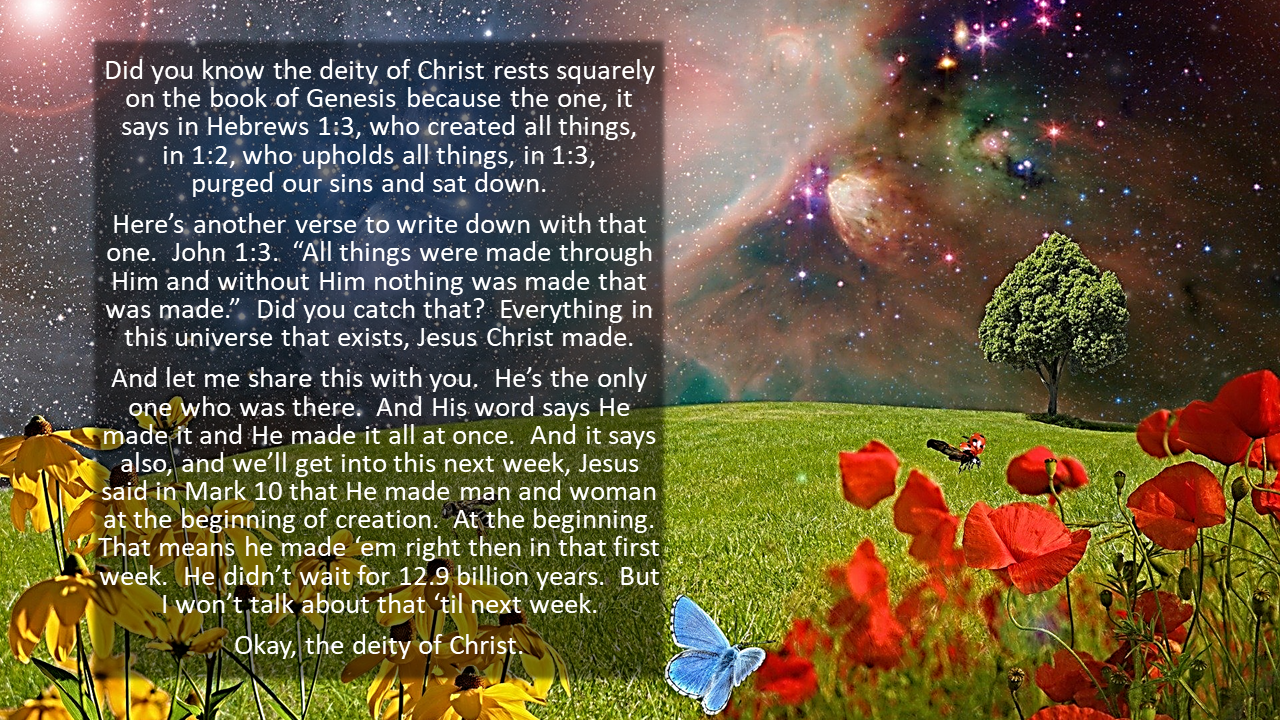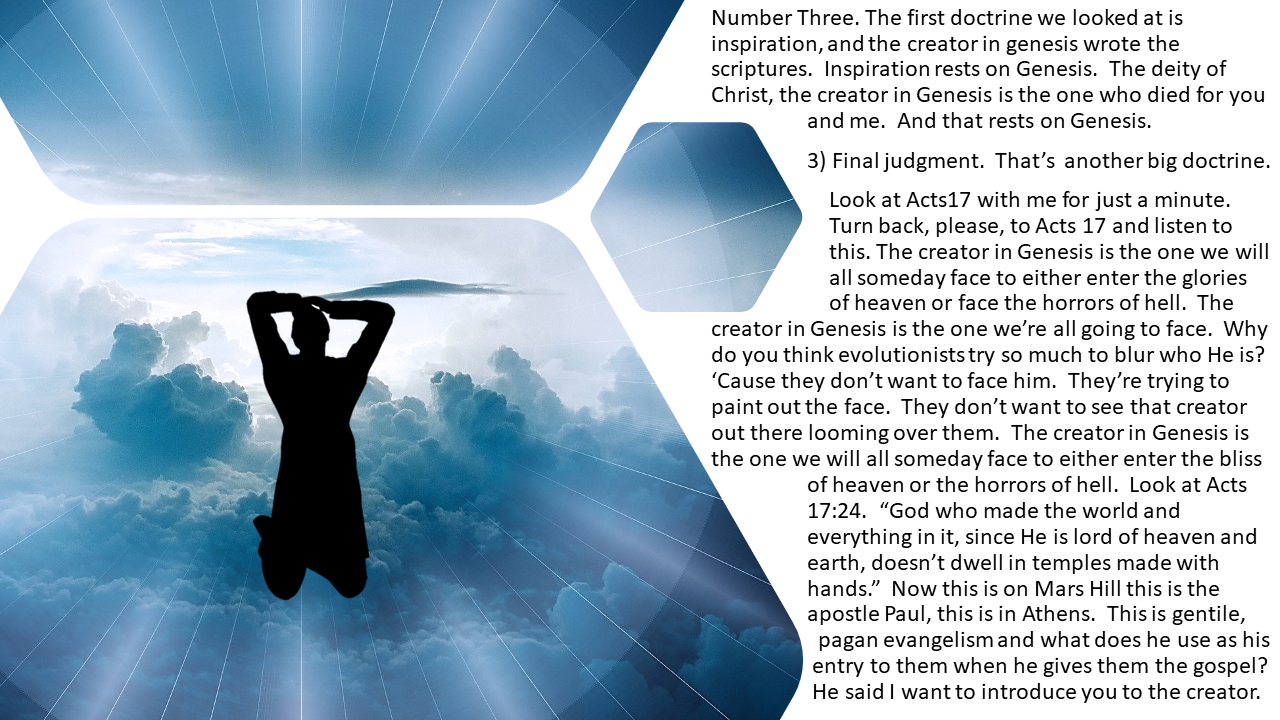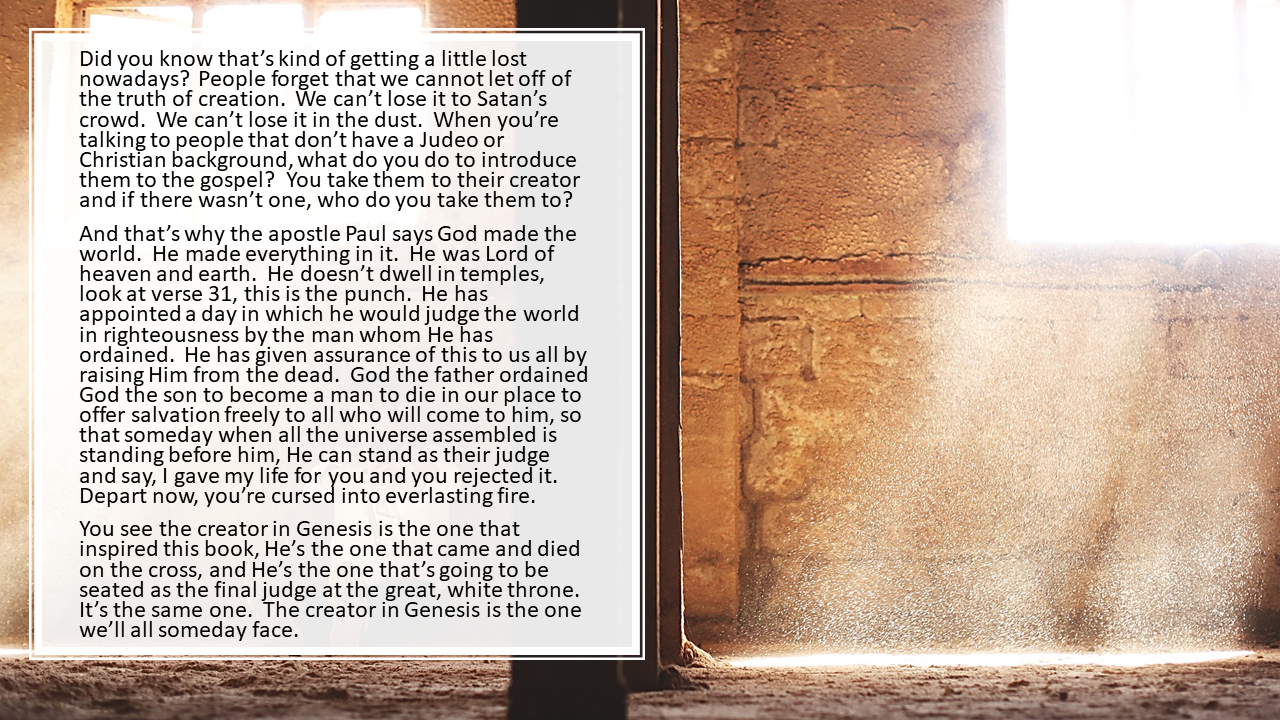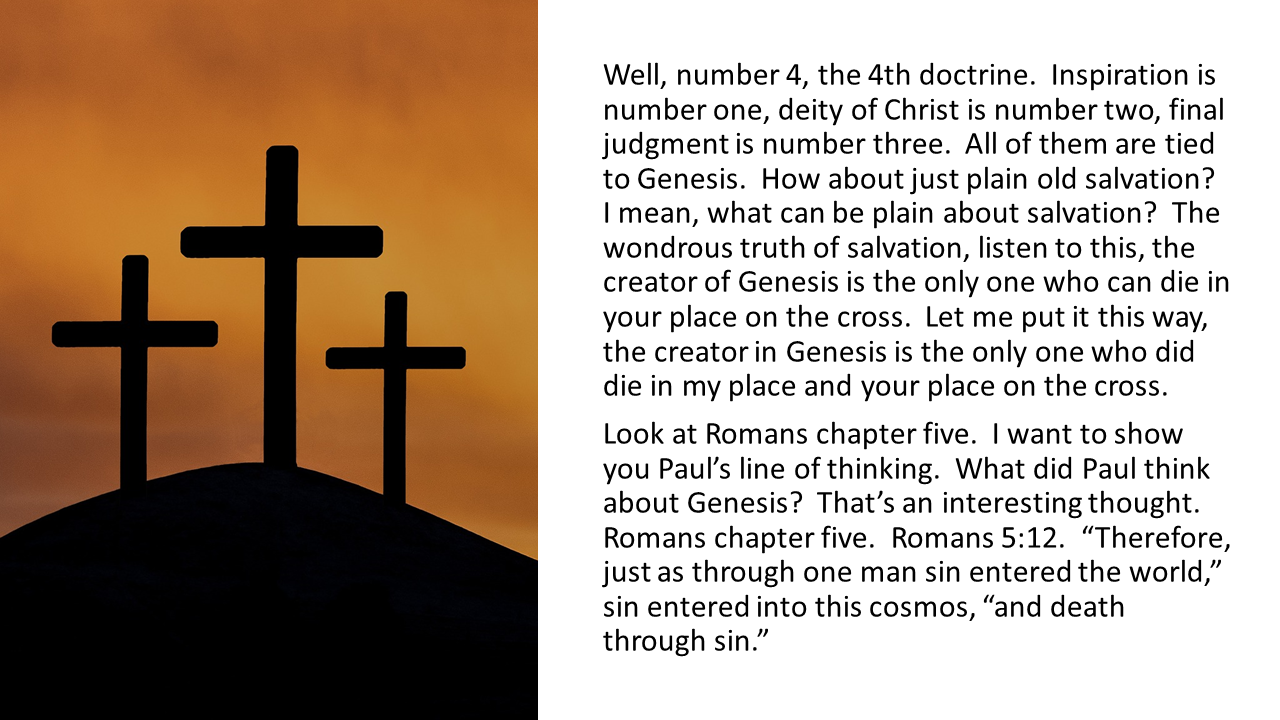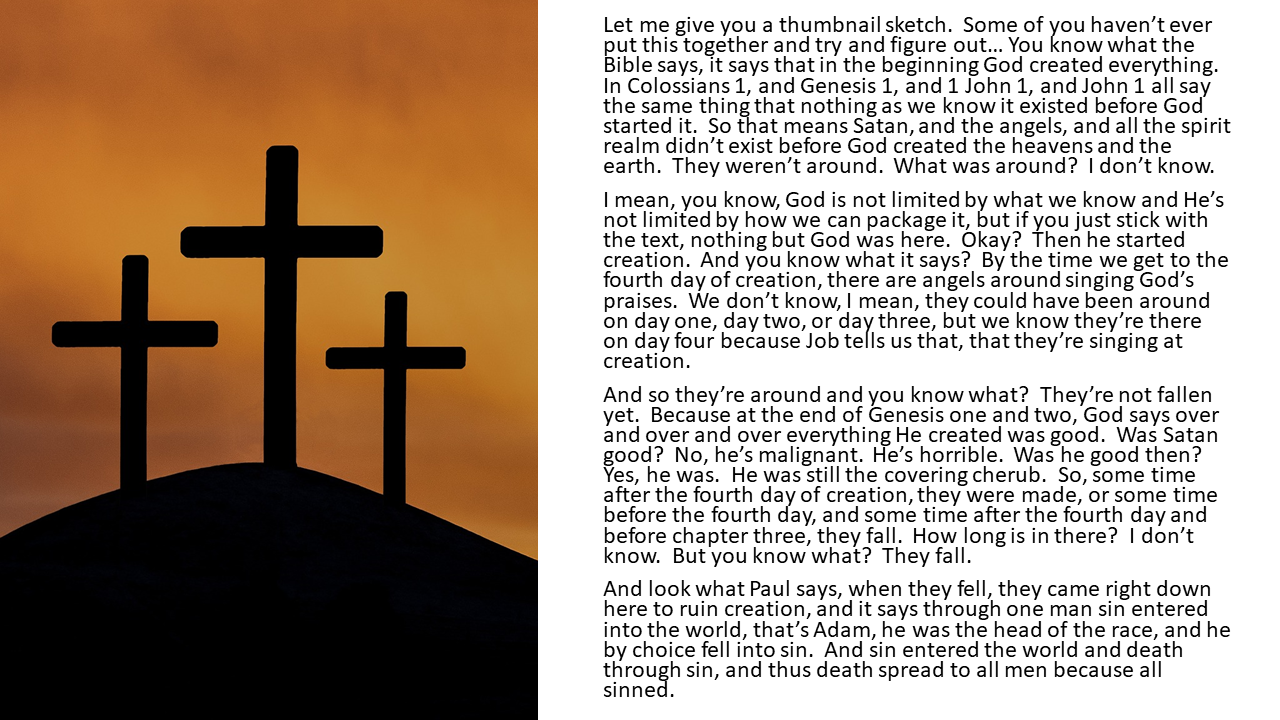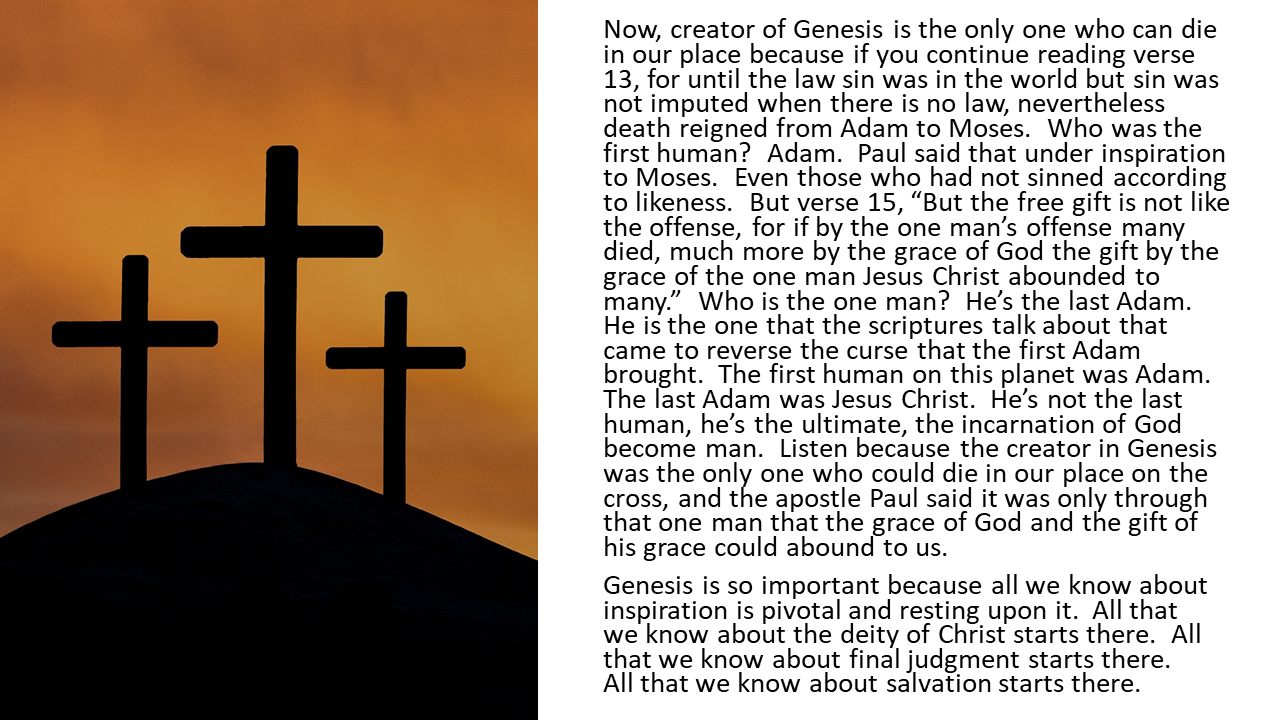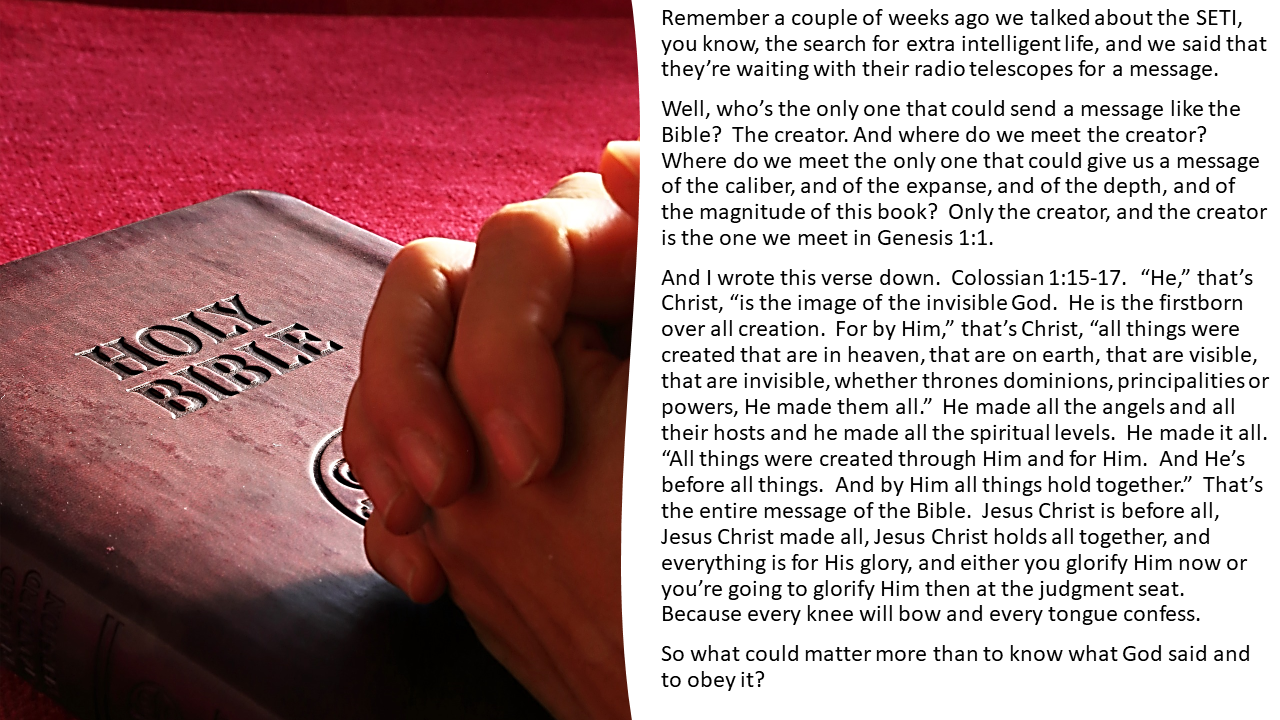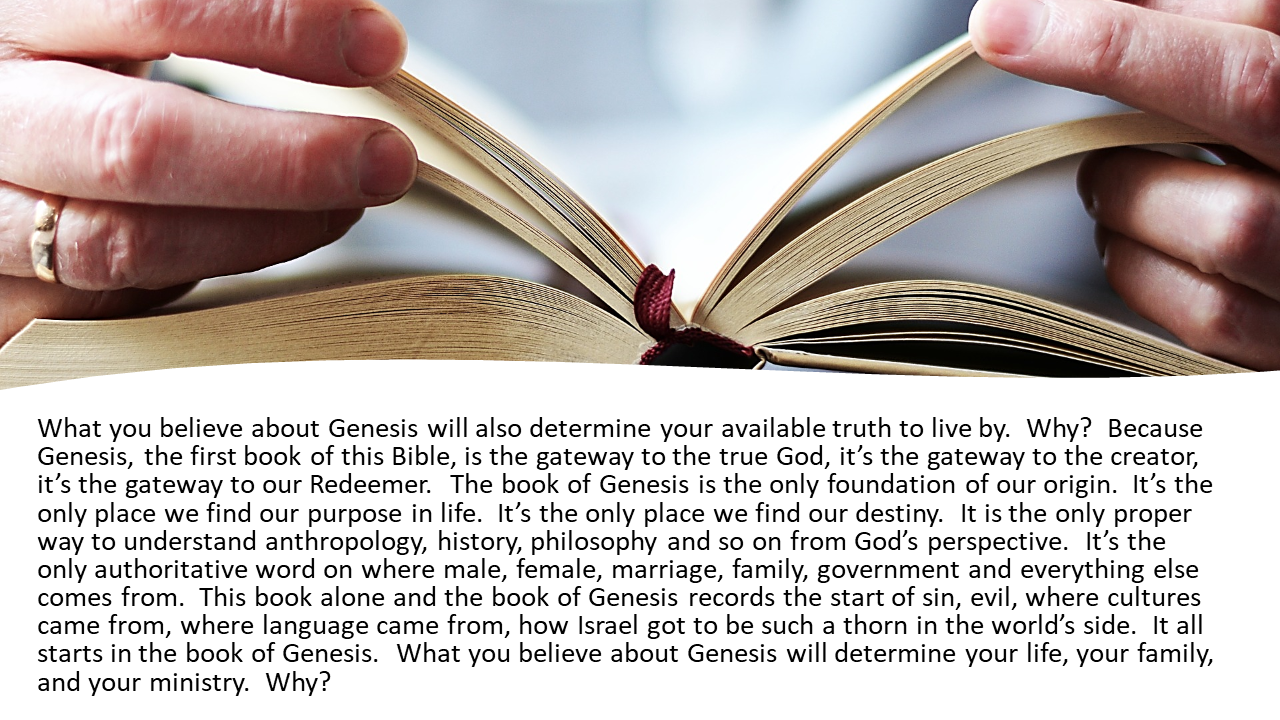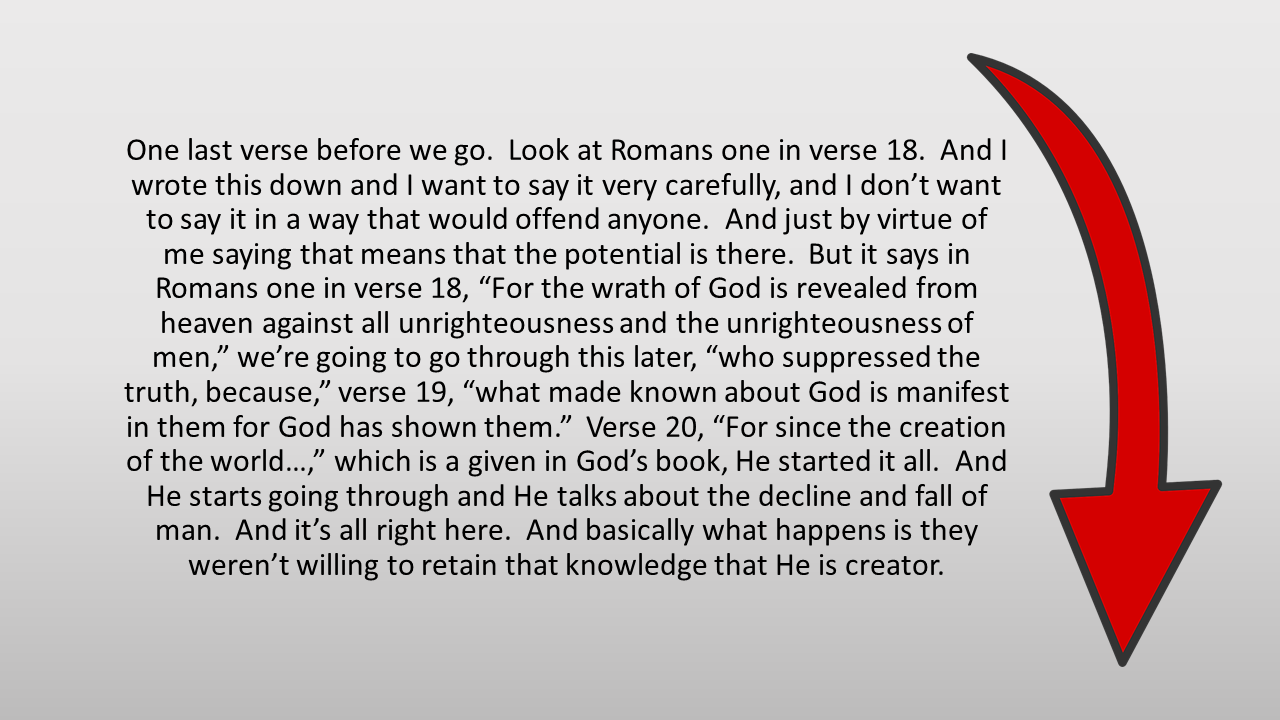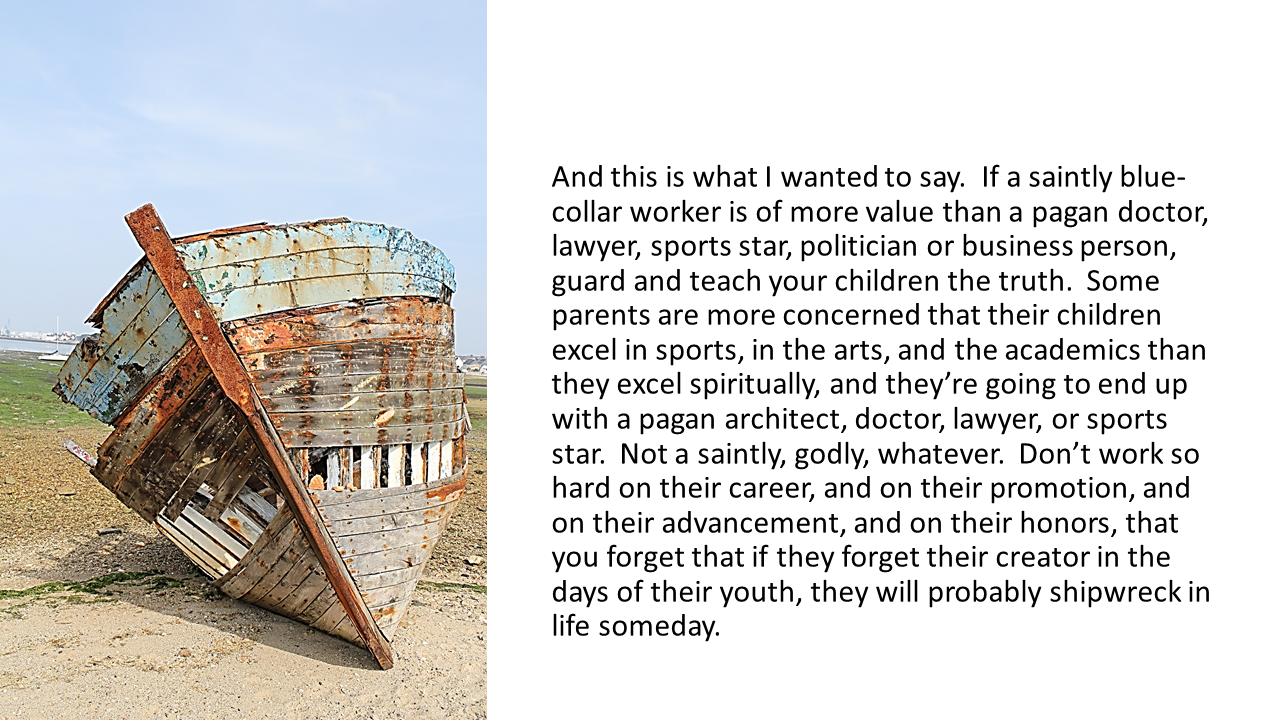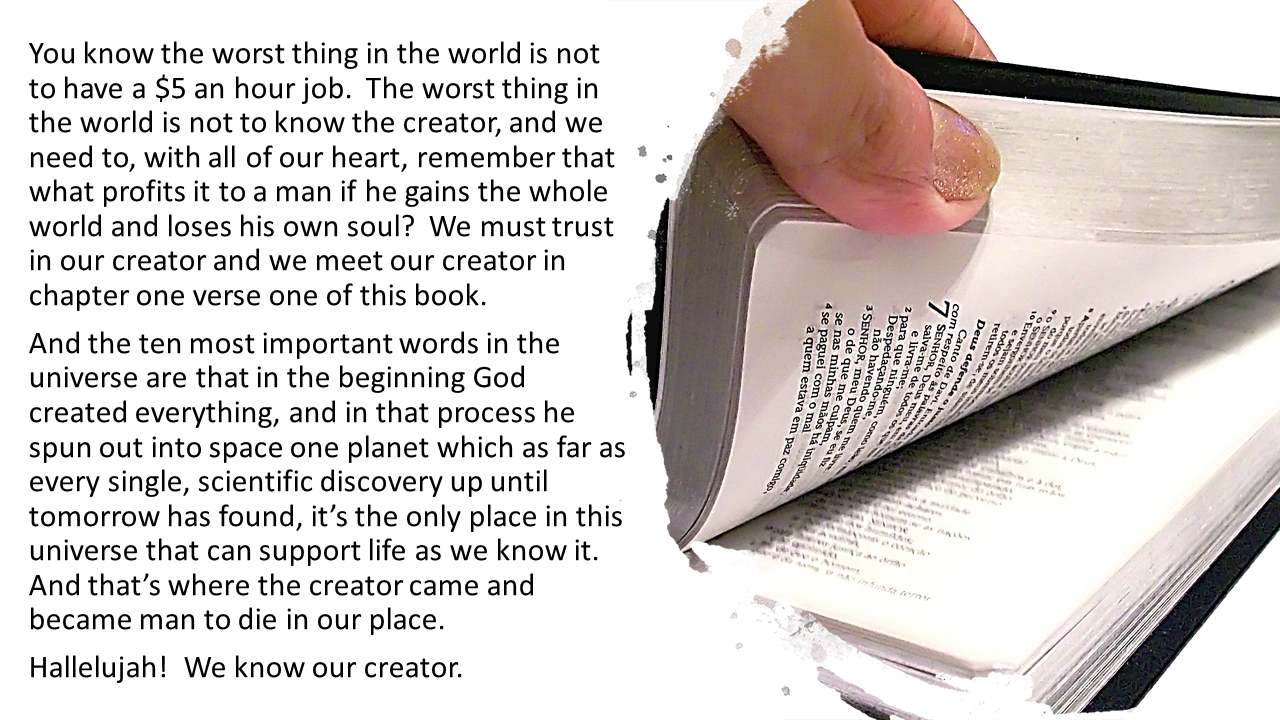If the YouTube video above is not available, here are two other ways to view:
BYT-04
960602AM
This morning there are ten words that will determine your destiny. In fact they’re the ten most important words in the whole universe. In fact, they’re the foundation for every single one of us this morning that have a hope of eternal life, that we are resting our eternal hope on. And they’re so important and they’re so vital that God put them first in the Bible so we wouldn’t miss them. And if you want to turn to the first ten words of the Bible, I want to read them to you this morning because these ten vital words touch every part of our life. They’re so crucial to the destiny of our souls. They’re the first words that Jesus and the apostles read at their mothers’ knees. For all Jewish children were taught to read starting with the Torah, the first five books of Moses. And it was customary that the mother would inscribe on a slate those words and would put honey on them and would have the children lick the honey off the slate to teach them how sweet the word of God was to their hearts. What were the first words that Jesus learned as a child? What were the first words the apostle Paul and the apostle Peter and apostle John and all the early saints of the church learned? Well, why don’t we read them. I’ll read them to you and you follow along. Genesis 1:1. The ten words that you can stake your life on. “In the beginning God created the heavens and the earth.”
Just before I continue in our little series on “The Book You Can Trust,” and this is our fourth part, and we’re looking at the first book of the book you can trust, and I call it Genesis, take it or lose it. Either you believe Genesis or you lose everything.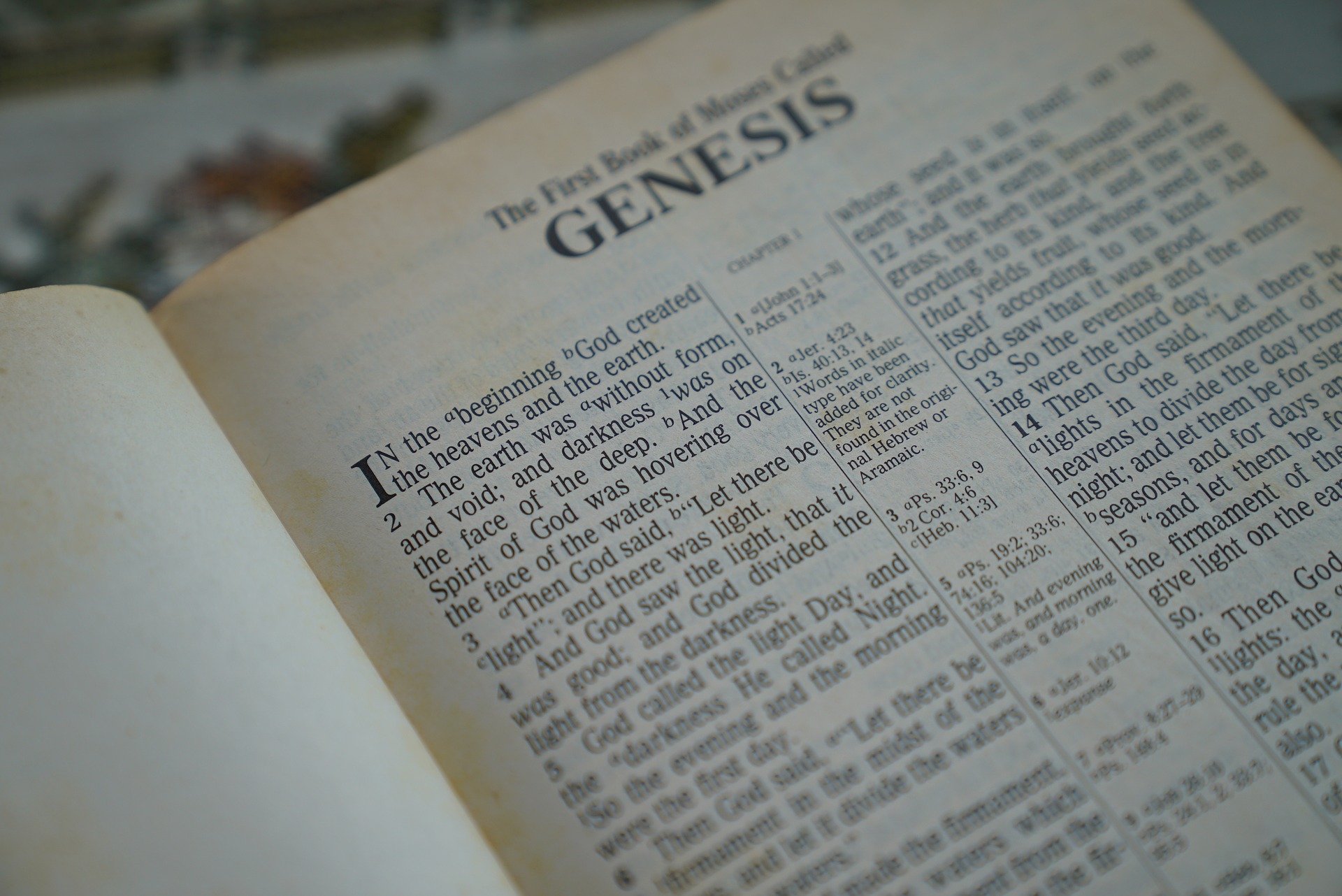
But I want to share with you, not from the Bible, I want to share with you from secular scientific discoveries. Okay? And I spent some time this week and I condensed down a lot of stuff, and I know some of you, you can just kind of take a chill pill right now, and you know it’s going to be a little boring ‘cause this is all science stuff. But I was amazed this week that secular scientists… in fact while I was waiting to have my hair cut, I picked up a magazine and the article I opened to in U.S. News and World Report said that there’s an evolutionary disconnect because everything we thought is not connecting with what we’re finding. And that’s in the U.S. News and World Report, which is not a glaring creationist publication, but I found that astrophysicists have garnered enough data to show beyond a doubt to them as a scientific community that this planet we float on in space is alone in the universe as far as life, as we know life to be, is concerned.
Now, what do I mean by that? What I mean by that is this. That scientists have discovered that there are a little less than, in the observable universe, a little less than one trillion galaxies. Now a galaxy, you know, is a spinning cloud of stars. There’s just a little less than a trillion of them. Each one of those galaxies averages 100 billion stars. So there’s a trillion spinning 100 billion star galaxies which, you know, it’s already, it’s beyond me. And we can see that by the following list I’m going to read to you that if these 23 elements are not present in the order they’re present on the earth, that there is no possibility of life being out there anywhere except here.
Now listen to this, this is what the scientists said. “Thus with considerable security, we can draw the conclusion that much fewer than one trillionth of a trillionth of a percent of all stars in all the known stars in the observable universe could possibly possess a planet capable of sustaining life as we know it (might I add, except for divine intervention which is why we’re here).
Now, what do I mean by that? Now, here’s what the scientists say. 1) If our planetary system had more than one star, in other words, if there was a binary star or something else instead of one sun, our tidal interactions would disrupt our planet’s orbit. If there was less than one star here, we would be frozen and we wouldn’t be alive. If the sun that God created out there was older, and remember, He created full-blown reproducing things. So He didn’t create a baby star growing up, He created a star at the right maturity. The sun that shines on us, occasionally, out there, if our sun was older, it would be dimming too quickly. If it was younger, it would be getting brighter and hotter too quickly. How about this? If the mass of our sun… You know our sun is 93 million miles away and it’s a star, a yellow star, and it’s burning, and it’s of a specific mass. If the mass of our sun was greater, the luminosity of our star would change too quickly. It would burn rapidly. The heavier they are, the faster they burn. If it was less mass, the range of distances appropriate to life would be too narrow. The tidal forces of our planet would disrupt the rotational period of our planet and the UV radiation would be inadequate to make sugar and oxygen on the planet.
Isn’t that interesting? What I’m saying, already I’ve lost half of you, but the first three conclusions the scientists have come to is if we didn’t have one star, if we had less than one or more than one, we wouldn’t be here. If our star was fatter or older, we’d be gone. How about this one? The color of our sun. There are many different colors of stars. If our sun was redder, the photosynthetic response would be insufficient; plants wouldn’t grow. And if you don’t have plants, whew, we’re gone. If it was bluer, the photosynthetic response wouldn’t be there. In other words, we’re the only color we can be to have light, yellow, which is life-giving sunlight. How about if the brightness of our sun, if the brightness was too much, we would have a runaway greenhouse effect, and this place it would be so bright that we would all be in a sauna. And pretty soon, you know what happens if you’re in there too long, you know, your skin gets white and then it falls off, and you know? If it was too dark, we would have runaway glaciation. That means we’d all be in koolees. You know? Like they sell at QT. We’d be freezing if it wasn’t that way. How about the earth? If the surface gravity (that’s the escape velocity, that’s how fast you have to go to get off the planet), if it was stronger, our atmosphere would retain too much ammonia and methane and we would become like Jupiter and we’d be a gaseous graveyard. If our surface gravity was weaker, the water would all dissipate out into the universe where there isn’t any water.
By the way, there’s no water that’s ever been detected anywhere in the universe except in our solar system. And you can’t have life without water as we know it.
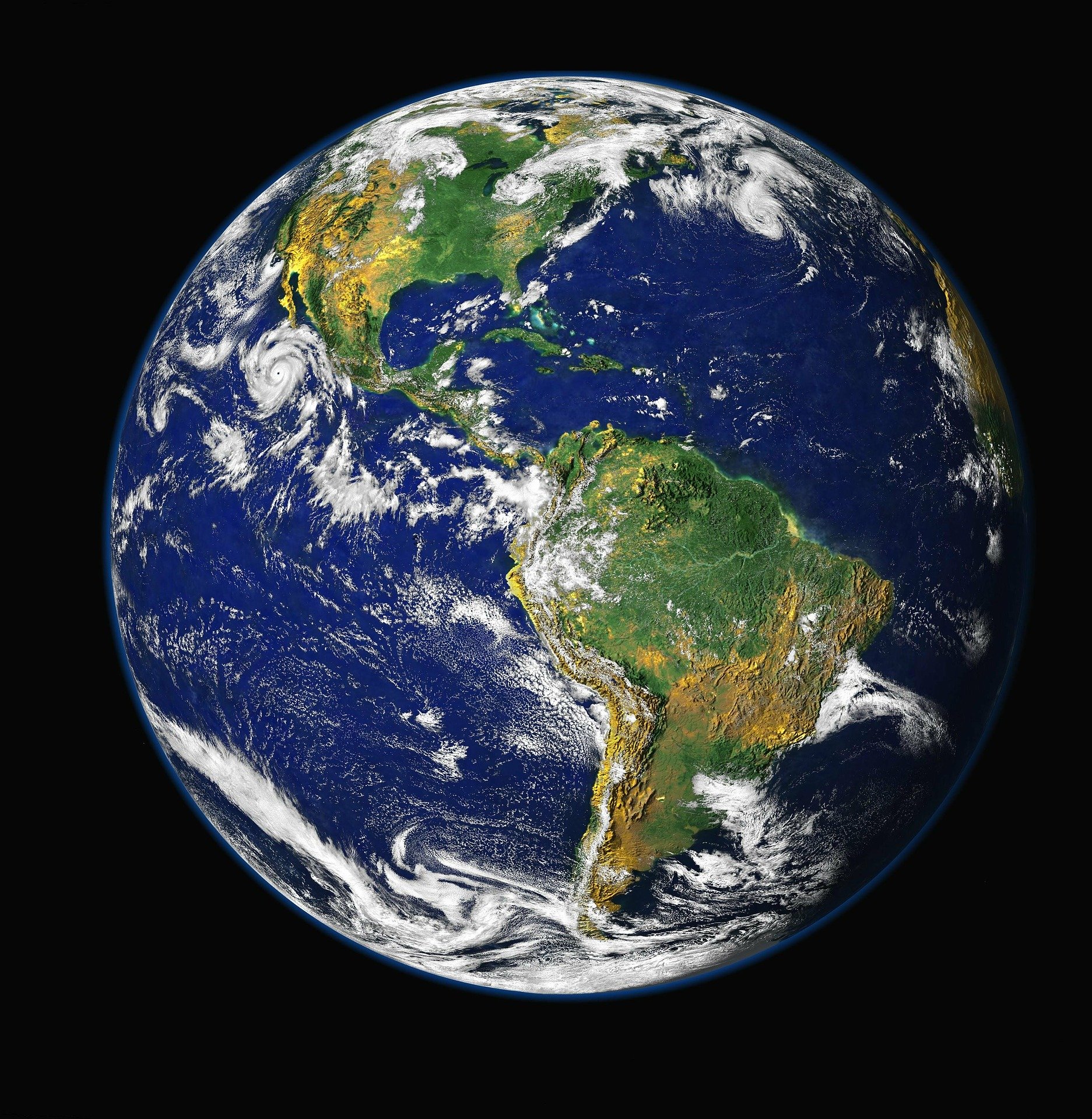 How about the earth’s distance from the sun? If we were further away, we’d be too cold. If we were closer, we would be burnt. How about the inclination of our orbit? That’s the orbit we… As we go around like this, and then we revolve around the sun, the way we’re inclined, if it was too great, the temperature differences on the planet would be so extreme that the place would be half desert and half frozen. If the inclination was not perfectly as it is, our seasonal temperature differences would be so much that our bodies could not live with the extreme 200 degree above zero to 100 degree below zero. How about the axial tilt? That’s where our axis is on our planet. You know the earth’s not like this. It’s slightly tilted. If it was greater, then the surface temperature difference would be too much between the north pole, the equator, and the south pole. If it was less, the same thing would happen. In other words, if the earth was just sitting like this instead of like this, that little tiny tilt that someone put on the axis of this planet when they spun it off into space is so exact that it makes us have the beautiful seasons and the temperature variation. If our rotation period, that’s how long it takes for a day, if it was longer, then the temperature difference would be too long different. Now it’s kind of nice. It cools down at night, but what would you think if our earth rotated every 30 days? Ha-ha. You know? How about if it was shorter. Well, the atmospheric wind velocities would be too great and they wouldn’t have to sell the movie twister. You’d see it all the time. Right? How about our magnetic field? You don’t even realize the power that if it was stronger, then there would be electromagnetic storms so severe that they would impair everything as we know it, as far as electronically, and it would start…You know how they say watch out going through the little airport thing with your pacemaker on? Well, it would be hard to have your pacemaker on with the storms going on overhead. If the magnetic field was weaker, the ozone shield that is held in place by it would be inadequately protected and hard stellar and solar radiation would just incinerate us. How about the thickness of our crust? I’m not talking about the homemade bread you have. I’m talking about on the earth. The thickness of the crust. If our crust on this planet was thicker, too much oxygen would be transferred from the atmosphere to the crust. In other words, the crust absorbs atmosphere. And if our crust was thicker, it would go sssllurp. And we’d all being going around wearing oxygen tanks ‘cause there wouldn’t be enough to breathe. If it was thinner, volcanic and tectonic activity would destroy us all. In other words, if it was just a little peeling of crust instead of miles thick of plates and then we’d all be jiggling around and it’d be like everybody lived in California. How about this? Here’s a big word you can learn. The albedo. You say, what’s that? That’s the reflective quality of the planet. That’s what scientists call how much reflection, the reflectivity of the matter of our planet. If we, if the light that comes to us was reflected off at a greater rate and not absorbed, we would freeze. That’s the light that warms the planet. If less of it reflected away, again we’d have the greenhouse and we’d all cook. In other words, God put together the right mix of elements so that just enough sunlight is reflected back and enough water is reflecting the light of the sun back but yet just enough of it’s absorbed to warm and to keep the planet just right. How about the oxygen to nitrogen ration in the atmosphere? If there was more oxygen than nitrogen, advanced life functions would go too quickly. We’d oxidize. If there was more nitrogen than oxygen, we would slow down our life functions and we would all atrophy. There’s just enough nitrogen and just enough oxygen. How about CO2? Carbon dioxide. If there was more, we’d have the greenhouse. If there was less, we couldn’t have photosynthesis, because the plants need that to do their work. How about water? This is number 16 for those of you who are counting. How about water level vapors? If there was too much water, we’d have a greenhouse. If there was less, we’d have a desert. How about lightning? If there was too much atmospheric electrical discharge, our planet would be burned. If there wasn’t as much as there is, there would not be enough nitrogen fixed in the atmosphere and fertilizer coming down to make the plants grow, as happens at every lightning storm. How about our ozone? Of course you know if there wasn’t enough, then the surface temperature would be too high, too much UV, we’d all get skin cancer. If there was more ozone, we would be cold. How about oxygen? If we had too much oxygen, plants and hydrocarbons would burn up. If we had less, we’d have nothing to breathe. How about earthquakes? Seismic activity? If our planet was not made with such an, remember last week, isostatic balance between the water and the mountains, then there would be too much seismic activity and there would be not an opportunity for us to be still long enough to live. How about soil minerals, mineralization? If there wasn’t the mineral content we have in our soil as it is, life could not grow from the soil. If there are too many nutrients, we would be limited because of overeating of the nutrients, and actually it would poison. Finally, how about the gravity that we interact with our moon? If we had a bigger moon that was closer or more mass, the tidal effects on the ocean would be that the oceans would wash across the continents much like the waves do across the sea. If we had a smaller moon or if it was further away, the orbital obliquity would change. It would cause climactic instabilities. The movements of nutrients would move away from the oceans to the continents and the magnetic fields would be dissipated.
How about the earth’s distance from the sun? If we were further away, we’d be too cold. If we were closer, we would be burnt. How about the inclination of our orbit? That’s the orbit we… As we go around like this, and then we revolve around the sun, the way we’re inclined, if it was too great, the temperature differences on the planet would be so extreme that the place would be half desert and half frozen. If the inclination was not perfectly as it is, our seasonal temperature differences would be so much that our bodies could not live with the extreme 200 degree above zero to 100 degree below zero. How about the axial tilt? That’s where our axis is on our planet. You know the earth’s not like this. It’s slightly tilted. If it was greater, then the surface temperature difference would be too much between the north pole, the equator, and the south pole. If it was less, the same thing would happen. In other words, if the earth was just sitting like this instead of like this, that little tiny tilt that someone put on the axis of this planet when they spun it off into space is so exact that it makes us have the beautiful seasons and the temperature variation. If our rotation period, that’s how long it takes for a day, if it was longer, then the temperature difference would be too long different. Now it’s kind of nice. It cools down at night, but what would you think if our earth rotated every 30 days? Ha-ha. You know? How about if it was shorter. Well, the atmospheric wind velocities would be too great and they wouldn’t have to sell the movie twister. You’d see it all the time. Right? How about our magnetic field? You don’t even realize the power that if it was stronger, then there would be electromagnetic storms so severe that they would impair everything as we know it, as far as electronically, and it would start…You know how they say watch out going through the little airport thing with your pacemaker on? Well, it would be hard to have your pacemaker on with the storms going on overhead. If the magnetic field was weaker, the ozone shield that is held in place by it would be inadequately protected and hard stellar and solar radiation would just incinerate us. How about the thickness of our crust? I’m not talking about the homemade bread you have. I’m talking about on the earth. The thickness of the crust. If our crust on this planet was thicker, too much oxygen would be transferred from the atmosphere to the crust. In other words, the crust absorbs atmosphere. And if our crust was thicker, it would go sssllurp. And we’d all being going around wearing oxygen tanks ‘cause there wouldn’t be enough to breathe. If it was thinner, volcanic and tectonic activity would destroy us all. In other words, if it was just a little peeling of crust instead of miles thick of plates and then we’d all be jiggling around and it’d be like everybody lived in California. How about this? Here’s a big word you can learn. The albedo. You say, what’s that? That’s the reflective quality of the planet. That’s what scientists call how much reflection, the reflectivity of the matter of our planet. If we, if the light that comes to us was reflected off at a greater rate and not absorbed, we would freeze. That’s the light that warms the planet. If less of it reflected away, again we’d have the greenhouse and we’d all cook. In other words, God put together the right mix of elements so that just enough sunlight is reflected back and enough water is reflecting the light of the sun back but yet just enough of it’s absorbed to warm and to keep the planet just right. How about the oxygen to nitrogen ration in the atmosphere? If there was more oxygen than nitrogen, advanced life functions would go too quickly. We’d oxidize. If there was more nitrogen than oxygen, we would slow down our life functions and we would all atrophy. There’s just enough nitrogen and just enough oxygen. How about CO2? Carbon dioxide. If there was more, we’d have the greenhouse. If there was less, we couldn’t have photosynthesis, because the plants need that to do their work. How about water? This is number 16 for those of you who are counting. How about water level vapors? If there was too much water, we’d have a greenhouse. If there was less, we’d have a desert. How about lightning? If there was too much atmospheric electrical discharge, our planet would be burned. If there wasn’t as much as there is, there would not be enough nitrogen fixed in the atmosphere and fertilizer coming down to make the plants grow, as happens at every lightning storm. How about our ozone? Of course you know if there wasn’t enough, then the surface temperature would be too high, too much UV, we’d all get skin cancer. If there was more ozone, we would be cold. How about oxygen? If we had too much oxygen, plants and hydrocarbons would burn up. If we had less, we’d have nothing to breathe. How about earthquakes? Seismic activity? If our planet was not made with such an, remember last week, isostatic balance between the water and the mountains, then there would be too much seismic activity and there would be not an opportunity for us to be still long enough to live. How about soil minerals, mineralization? If there wasn’t the mineral content we have in our soil as it is, life could not grow from the soil. If there are too many nutrients, we would be limited because of overeating of the nutrients, and actually it would poison. Finally, how about the gravity that we interact with our moon? If we had a bigger moon that was closer or more mass, the tidal effects on the ocean would be that the oceans would wash across the continents much like the waves do across the sea. If we had a smaller moon or if it was further away, the orbital obliquity would change. It would cause climactic instabilities. The movements of nutrients would move away from the oceans to the continents and the magnetic fields would be dissipated.
Now all this, let me get back to the science book. Here’s what he said. “If each of these 23 parameters exceeds even a tiny limit, not to mention the dozen I haven’t mentioned,” the scientist said, “there would be no possibility of life on this planet.”
And by the way, the 23 things I just read to you are so minutely tied to one another that by multiplying the factors of their probability of occurring they say that for those 23 events to work in confidence, which is what it takes to have life, there is no place in the entire, known universe where life could exist except here.
Now let’s get back to Genesis 1:1. I said all that to tell you this.
And by the way, this writer concludes with this. He said, “Rather than spending $100 million by the U.S. Government each year looking for extraterrestrial intelligence, Senator William Proxmire, the former senator, said we should better spend the money looking for some intelligent life in Washington.” That was a good quote I thought. I didn’t want to let you lose that.
Back to Genesis 1:1. In the beginning, God… in the whole universe after making it, formed one planet to put life on. And He tilted it, and rotated it, and revolved it around the right color star, and put just the right moon at the right distance, and spun it at the right speed, and then he salted it with just the right number of minerals and trace elements, breathed into it just the right amount of nitrogen and oxygen and all the other things, and put life in that little fragile canopy of our atmosphere. That’s what it says in Genesis 1:1. And within those words we find all there is. God, the universe, the end and now. Everything is encompassed in those words, and from them flow all the guidelines God has given us to meet Him, to know Him, and to please Him.
In other words, no book of the scriptures matters more than this one. Because every other book and every other doctrine, every other comprehension of God rests right on those 10 words. Because the God you meet in Genesis 1:1 is the same God that’s in the rest of the Bible. And if the God of Genesis 1:1 is unreliable, so is the one everywhere else. Either you utterly trust the God you meet in Genesis 1 or you don’t have anything else. He’s the same and He doesn’t change.
And so as we’re studying the book you can trust, the book you can trust starts with the first book of the 66 books that make up the one book that you can trust. And I hope this morning that you have an overwhelming awareness of how crucial the truth is that you’re going to look at in the book of Genesis this morning. Okay?
 The book of Genesis is the foundation and you might want to take some notes for these. I’m going to give you a few of the doctrines that are foundational to this book, and there’s room on the back of your bulletins. We always give you a few lines to write on. But the book of Genesis is a foundation for the doctrines that follow. Everything you base your eternal destiny upon starts in Genesis. Let’s look at this, okay?
The book of Genesis is the foundation and you might want to take some notes for these. I’m going to give you a few of the doctrines that are foundational to this book, and there’s room on the back of your bulletins. We always give you a few lines to write on. But the book of Genesis is a foundation for the doctrines that follow. Everything you base your eternal destiny upon starts in Genesis. Let’s look at this, okay?
Genesis 1:1, “In the beginning God created…”. Okay, now. Turn with me to Hebrews chapter one. I want to show you the first doctrine that is predicated on Genesis 1:1. The book of Hebrews in the New Testament near the end. Timonthy, Titus, Philemon, Hebrews. James and all the way through near the end; about six from the end. Okay? ‘Cause doctrine number one that Genesis is the foundation for is the doctrine we call the doctrine of inspiration. And here is the key. The creator in Genesis, the one in Genesis 1:1 is the one that wrote the Bible. Did you know that? I mean the one that started everything from nothing instantaneously is the one that wrote the whole book.
Look what Hebrews 1:1,2 says, okay? Chapter one, verses one and two. “God,” who at various times and in various ways spoke in times past to the fathers by the prophets, hath in these last days spoken to us by His son, by whom He appointed heir of all things,” listen, “through whom also He made the world.” Who’s the creator? Jesus. Who is the author of scripture? Jesus.
1 Peter 1:11, “Searching what or what manner of time the spirit of Christ which was in them did signify when he testified beforehand the sufferings of Christ and the glory that should follow.” Who was inspiring the prophets? Who inspired Moses? It was the Holy Spirit of Christ that inspired the scriptures.
Someone said to me once, well, I only like the red words. Did you know if that was, you know, if the publishers did this right, every word would be red. They’re all the words of Christ. Did you know that? It’s not the words of Solomon. It’s not the words of Jonah, you know, the wayward prophet. It’s not the words of doubting whoever, it’s the words of Christ. Every word of God is pure.
Point number one: inspiration is foundational to Genesis 1:1 because the creator in Genesis wrote the scriptures. He wrote those things. And even though, and next week, and I’ll give you the, I’ll give you, you know, my thing this week, yes I know that there are many divergent opinions about creation. Yes, I know that many good and godly people believe all kinds of stuff. But you know the way you decide what Genesis one means is not stacking up all the scientific evidence and all the theologians and what the current popular people are saying. You look at what it says, and what the people that wrote it thought it said, and what the people that read it thought it said, and what God says, and then you weigh that against current scientific thought. Which, by the way, if you wait long enough, is going to keep coming this way.
At the barber shop this week, you know what else I read? They say, we used to think that there were Neanderthals and then the modern man, but now we’ve found out that the two existed at the same time.
Isn’t that interesting? That’s what the Bible has always said.
Okay. 1) Inspiration. The creator in Genesis wrote the book. 2) How about the deity of Christ? Look at verse three of Hebrews chapter one. Because the deity of Christ is a very prime doctrine of scripture, and the deity of Christ rests solely on Genesis 1:1. Okay? Because the creator in Genesis is the one who died for you and for me. Verse three. “Who being the brightness of His glory,” this is talking about Christ, “and the express image of His person…”. What does that mean? That means Jesus is the exact representation of God. I like the way W.A. Criswell, First Baptist of Dallas, puts it. He said, the only God you’ll ever see is Jesus Christ. ‘Cause Jesus is the exact representation. God is a spirit.  He’s invisible. Yes, he’s, you know, glowing and the spirit of God shows up like a dove, but you aren’t going to see three men walking around in heaven, you know, waving like this, you know? It’s three in one. And it’s going to be the father on the throne, and the lamb before him, but the only God you will ever see is God the father, the son, and the holy spirit. We do not have three gods. We have one in three persons. Three distinct, three separate, three individual persons, three… I mean, I’m not going to go into all the apostolic creeds and doctrines, but the God you see is Jesus Christ.
He’s invisible. Yes, he’s, you know, glowing and the spirit of God shows up like a dove, but you aren’t going to see three men walking around in heaven, you know, waving like this, you know? It’s three in one. And it’s going to be the father on the throne, and the lamb before him, but the only God you will ever see is God the father, the son, and the holy spirit. We do not have three gods. We have one in three persons. Three distinct, three separate, three individual persons, three… I mean, I’m not going to go into all the apostolic creeds and doctrines, but the God you see is Jesus Christ.
Now some people they start, ummm. You know, they can’t figure that out. But the trinity is very hard to figure out. The Bible doesn’t say we’re supposed to figure it out. It says we’re supposed to believe it. But the creator in Genesis is the one who died for you. He’s the one who is in the beginning. He is the one who created all things. He is the one who is incarnate. When Christ was on earth, was God the father still in heaven, God the spirit? Yes. ‘Cause there are three persons. But those three are always one.
Now, you know, don’t blow a fuse on that one, but just come back to verse three of Hebrews one. “Who being the brightness of His glory,” Jesus is the brightness of the glory of God, “who being the express image of His person.” Jesus is the exact representation of the person of God. “…and upholding all things by the word of His power.” When He had, by himself, purged our sins, He sat down at the right hand of the majesty on high. God the son sat down at the right hand of God the father when God the son completed our salvation.
Did you know the deity of Christ rests squarely on the book of Genesis because the one, it says in Hebrews 1:3, who created all things, in 1:2, who upholds all things, in 1:3, purged our sins and sat down.
Here’s another verse to write down with that one. John 1:3. “All things were made through Him and without Him nothing was made that was made.” Did you catch that? Everything in this universe that exists, Jesus Christ made.
And let me share this with you. He’s the only one who was there. And His word says He made it and He made it all at once. And it says also, and we’ll get into this next week, Jesus said in Mark 10 that He made man and woman at the beginning of creation. At the beginning. That means he made ‘em right then in that first week. He didn’t wait for 12.9 billion years. But I won’t talk about that ‘til next week.
Okay, the deity of Christ. 3) The first doctrine we looked at is inspiration, and the creator in genesis wrote the scriptures. Inspiration rests on Genesis. The deity of Christ, the creator in Genesis is the one who died for you and me. And that rests on Genesis. 3) Final judgment. That’s another big doctrine.
Look at Acts chapter 17 with me for just a minute. Turn back, please, to Acts chapter 17 and listen to this. The creator in Genesis is the one we will all someday face to either enter the glories of heaven or face the horrors of hell. The creator in Genesis is the one we’re all going to face. Why do you think evolutionists try so much to blur who He is? ‘Cause they don’t want to face him. They’re trying to paint out the face. They don’t want to see that creator out there looming over them. The creator in Genesis is the one we will all someday face to either enter the bliss of heaven or the horrors of hell. Look at Acts 17 verse 24. “God who made the world and everything in it, since He is lord of heaven and earth, doesn’t dwell in temples made with hands.” Now this is on Mars Hill this is the apostle Paul, this is in Athens. This is gentile, pagan evangelism and what does he use as his entry to them when he gives them the gospel? He said I want to introduce you to the creator.
Did you know that’s kind of getting a little lost nowadays? People forget that we cannot let off of the truth of creation. We can’t lose it to Satan’s crowd. We can’t lose it in the dust. When you’re talking to people that don’t have a Judeo or Christian background, what do you do to introduce them to the gospel? You take them to their creator and if there wasn’t one, who do you take them to?
 And that’s why the apostle Paul says God made the world. He made everything in it. He was Lord of heaven and earth. He doesn’t dwell in temples, look at verse 31, this is the punch. He has appointed a day in which he would judge the world in righteousness by the man whom He has ordained. He has given assurance of this to us all by raising Him from the dead. God the father ordained God the son to become a man to die in our place to offer salvation freely to all who will come to him, so that someday when all the universe assembled is standing before him, He can stand as their judge and say, I gave my life for you and you rejected it. Depart now, you’re cursed into everlasting fire.
And that’s why the apostle Paul says God made the world. He made everything in it. He was Lord of heaven and earth. He doesn’t dwell in temples, look at verse 31, this is the punch. He has appointed a day in which he would judge the world in righteousness by the man whom He has ordained. He has given assurance of this to us all by raising Him from the dead. God the father ordained God the son to become a man to die in our place to offer salvation freely to all who will come to him, so that someday when all the universe assembled is standing before him, He can stand as their judge and say, I gave my life for you and you rejected it. Depart now, you’re cursed into everlasting fire.
You see the creator in Genesis is the one that inspired this book, He’s the one that came and died on the cross, and He’s the one that’s going to be seated as the final judge at the great, white throne. It’s the same one. The creator in Genesis is the one we’ll all someday face.
Well, number four, the fourth doctrine. Inspiration is number one, deity of Christ is number two, final judgment is number three. All of them are tied to Genesis. How about just plain old salvation? I mean, what can be plain about salvation? The wondrous truth of salvation, listen to this, the creator of Genesis is the only one who can die in your place on the cross. Let me put it this way, the creator in Genesis is the only one who did die in my place and your place on the cross.
Look at Romans chapter five. I want to show you Paul’s line of thinking. What did Paul think about Genesis? That’s an interesting thought. Romans chapter five. Romans five, chapter five verse 12. “Therefore, just as through one man sin entered the world,” sin entered into this cosmos, “and death through sin.”
Let me give you a thumbnail sketch. Some of you haven’t ever put this together and try and figure out… You know what the Bible says, it says that in the beginning God created everything. In Colossians one, and Genesis one, and 1 John one, and John one all say the same thing that nothing as we know it existed before God started it. So that means Satan, and the angels, and all the spirit realm didn’t exist before God created the heavens and the earth. They weren’t around. What was around? I don’t know. I mean, you know, God is not limited by what we know and He’s not limited by how we can package it, but if you just stick with the text, nothing but God was here. Okay? Then he started creation. And you know what it says? By the time we get to the fourth day of creation, there are angels around singing God’s praises. We don’t know, I mean, they could have been around on day one, day two, or day three, but we know they’re there on day four because Job tells us that, that they’re singing at creation. And so they’re around and you know what? They’re not fallen yet. Because at the end of Genesis one and two, God says over and over and over everything He created was good. Was Satan good? No, he’s malignant. He’s horrible. Was he good then? Yes, he was. He was still the covering cherub. So, some time after the fourth day of creation, they were made, or some time before the fourth day, and some time after the fourth day and before chapter three, they fall. How long is in there? I don’t know. But you know what? They fall.
And look what Paul says, when they fell, they came right down here to ruin creation, and it says through one man sin entered into the world, that’s Adam, he was the head of the race, and he by choice fell into sin. And sin entered the world and death through sin, and thus death spread to all men because all sinned. Now, creator of Genesis is the only one who can die in our place because if you continue reading verse 13, for until the law sin was in the world but sin was not imputed when there is no law, nevertheless death reigned from Adam to Moses. Who was the first human? Adam. Paul said that under inspiration to Moses. Even those who had not sinned according to likeness. But verse 15, “But the free gift is not like the offense, for if by the one man’s offense many died, much more by the grace of God the gift by the grace of the one man Jesus Christ abounded to many.” Who is the one man? He’s the last Adam. He is the one that the scriptures talk about that came to reverse the curse that the first Adam brought. The first human on this planet was Adam. The last Adam was Jesus Christ. He’s not the last human, he’s the ultimate, the incarnation of God become man. Listen because the creator in Genesis was the only one who could die in our place on the cross, and the apostle Paul said it was only through that one man that the grace of God and the gift of his grace could abound to us.
Genesis is so important because all we know about inspiration is pivotal and resting upon it. All that we know about the deity of Christ starts there. All that we know about final judgment starts there. All that we know about salvation starts there.
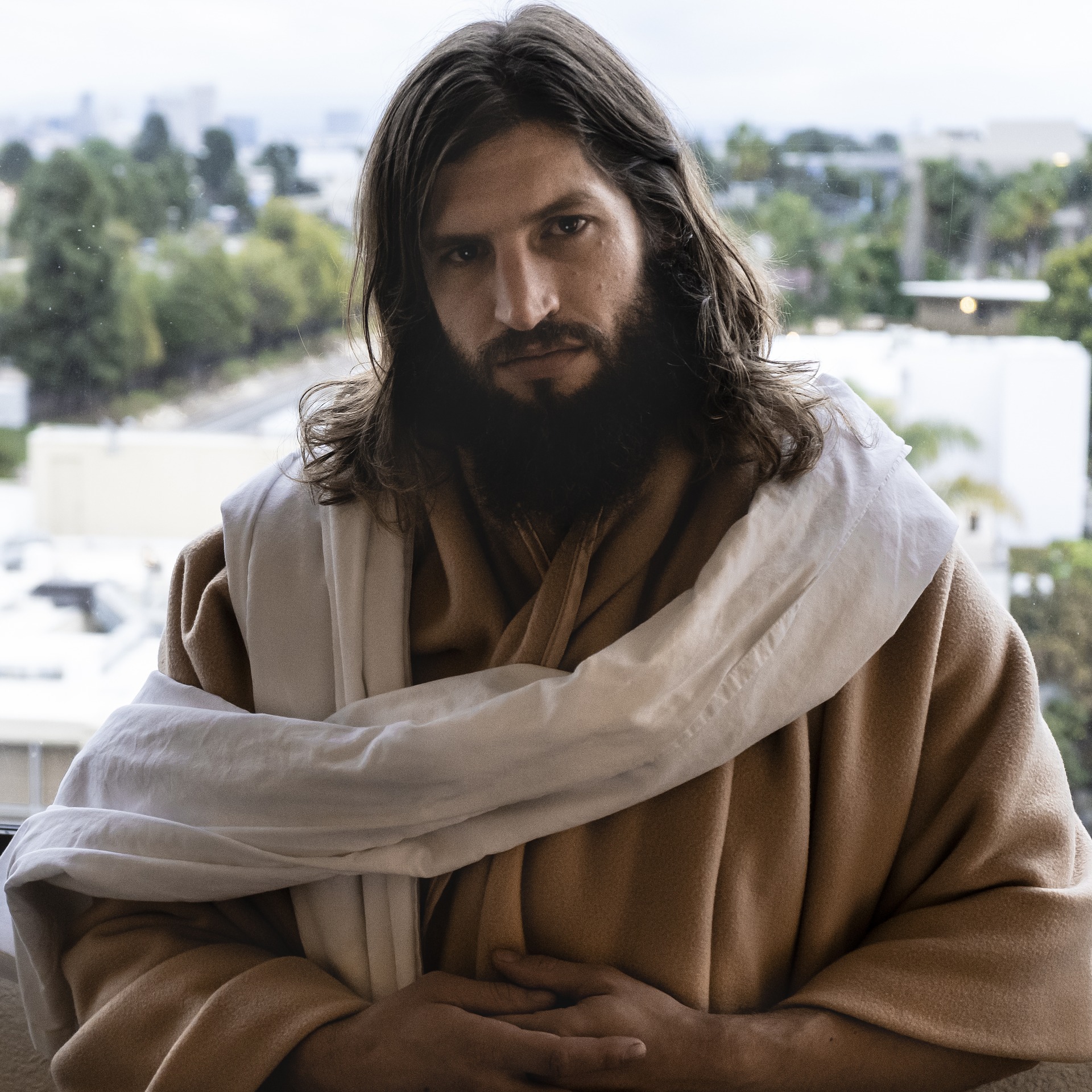 How about the trustworthiness of Christ? That’s a fifth doctrine I think is very important. And the creator in Genesis is the only one who knows what happened at the beginning, and it says in Mark 10:6, “But from the beginning of creation God made the male and female,” Jesus said. Jesus spoke with authority about the beginning of creation because He was there. And we should trust His trustworthiness because He was there and He is God. And He’s the one that tells us everything that we need to know about what happened at that time.
How about the trustworthiness of Christ? That’s a fifth doctrine I think is very important. And the creator in Genesis is the only one who knows what happened at the beginning, and it says in Mark 10:6, “But from the beginning of creation God made the male and female,” Jesus said. Jesus spoke with authority about the beginning of creation because He was there. And we should trust His trustworthiness because He was there and He is God. And He’s the one that tells us everything that we need to know about what happened at that time.
And finally, the whole message of the Bible is based on Genesis one because the creator in Genesis is the only one who could send a message like we have in the scriptures.
Remember a couple of weeks ago we talked about the SETI, you know, the search for extra intelligent life, and we said that they’re waiting with their radio telescopes for a message.
Well, who’s the only one that could send a message like the Bible? The creator. And where do we meet the creator? Where do we meet the only one that could give us a message of the caliber, and of the expanse, and of the depth, and of the magnitude of this book? Only the creator, and the creator is the one we meet in Genesis 1:1.
And I wrote this verse down. Colossian 1:15-17. “He,” that’s Christ, “is the image of the invisible God. He is the firstborn over all creation. For by Him,” that’s Christ, “all things were created that are in heaven, that are on earth, that are visible, that are invisible, whether thrones dominions, principalities or powers, He made them all.” He made all the angels and all their hosts and he made all the spiritual levels. He made it all. “All things were created through Him and for Him. And He’s before all things. And by Him all things hold together.” That’s the entire message of the Bible. Jesus Christ is before all, Jesus Christ made all, Jesus Christ holds all together, and everything is for His glory, and either you glorify Him now or you’re going to glorify Him then at the judgment seat. Because every knee will bow and every tongue confess. So what could matter more than to know what God said and to obey it?
What you believe about Genesis will also determine your available truth to live by. Why? Because Genesis, the first book of this Bible, is the gateway to the true God, it’s the gateway to the creator, it’s the gateway to our Redeemer. The book of Genesis is the only foundation of our origin. It’s the only place we find our purpose in life. It’s the only place we find our destiny. It is the only proper way to understand anthropology, history, philosophy and so on from God’s perspective. It’s the only authoritative word on where male, female, marriage, family, government and everything else comes from. This book alone and the book of Genesis records the start of sin, evil, where cultures came from, where language came from, how Israel got to be such a thorn in the world’s side. It all starts in the book of Genesis. What you believe about Genesis will determine your life, your family, and your ministry. Why?
 One last verse before we go. Look at Romans one in verse 18. And I wrote this down and I want to say it very carefully, and I don’t want to say it in a way that would offend anyone. And just by virtue of me saying that means that the potential is there. But it says in Romans one in verse 18, “For the wrath of God is revealed from heaven against all unrighteousness and the unrighteousness of men,” we’re going to go through this later, “who suppressed the truth, because,” verse 19, “what made known about God is manifest in them for God has shown them.” Verse 20, “For since the creation of the world…,” which is a given in God’s book, He started it all. And He starts going through and He talks about the decline and fall of man. And it’s all right here. And basically what happens is they weren’t willing to retain that knowledge that He is creator. And you know what? All declension starts right on this point. All declension, morally, philosophically, spiritually, starts with a departure from the creator. Now, why is that so important? If our children are not taught truth that they can hold on to, they will drift from the faith and shipwreck. If you say, that scientific stuff is not for me. Whatever, you know, just go to school and whatever they tell you, take with a grain of salt. If they lose the mooring of their creator, they will shipwreck. They will shipwreck. Spiritually, sooner or later philosophically, and what follows that is morally. You need to guard what they’re getting in school. You need to shield what they’re exposed to as far as error and false teaching. You need to promote a lot of exposure to the truth daily. They ought to hear about God from you, not just in Sunday school, not just from me, not just from the youth group. From you and you should lead them by example into the pursuit and fellowship of God’s people. And this is what I wanted to say. If a saintly blue-collar worker is of more value than a pagan doctor, lawyer, sports star, politician or business person, guard and teach your children the truth. Some parents are more concerned that their children excel in sports, in the arts, and the academics than they excel spiritually, and they’re going to end up with a pagan architect, doctor, lawyer, or sports star. Not a saintly, godly, whatever. Don’t work so hard on their career, and on their promotion, and on their advancement, and on their honors, that you forget that if they forget their creator in the days of their youth, they will probably shipwreck in life someday. You know the worst thing in the world is not to have a $5 an hour job. The worst thing in the world is not to know the creator, and we need to, with all of our heart, remember that what profits it to a man if he gains the whole world and loses his own soul? We must trust in our creator and we meet our creator in chapter one verse one of this book. And the ten most important words in the universe are that in the beginning God created everything, and in that process he spun out into space one planet which as far as every single, scientific discovery up until tomorrow has found, it’s the only place in this universe that can support life as we know it. And that’s where the creator came and became man to die in our place. Hallelujah! We know our creator. Let’s bow before him in prayer this morning.
One last verse before we go. Look at Romans one in verse 18. And I wrote this down and I want to say it very carefully, and I don’t want to say it in a way that would offend anyone. And just by virtue of me saying that means that the potential is there. But it says in Romans one in verse 18, “For the wrath of God is revealed from heaven against all unrighteousness and the unrighteousness of men,” we’re going to go through this later, “who suppressed the truth, because,” verse 19, “what made known about God is manifest in them for God has shown them.” Verse 20, “For since the creation of the world…,” which is a given in God’s book, He started it all. And He starts going through and He talks about the decline and fall of man. And it’s all right here. And basically what happens is they weren’t willing to retain that knowledge that He is creator. And you know what? All declension starts right on this point. All declension, morally, philosophically, spiritually, starts with a departure from the creator. Now, why is that so important? If our children are not taught truth that they can hold on to, they will drift from the faith and shipwreck. If you say, that scientific stuff is not for me. Whatever, you know, just go to school and whatever they tell you, take with a grain of salt. If they lose the mooring of their creator, they will shipwreck. They will shipwreck. Spiritually, sooner or later philosophically, and what follows that is morally. You need to guard what they’re getting in school. You need to shield what they’re exposed to as far as error and false teaching. You need to promote a lot of exposure to the truth daily. They ought to hear about God from you, not just in Sunday school, not just from me, not just from the youth group. From you and you should lead them by example into the pursuit and fellowship of God’s people. And this is what I wanted to say. If a saintly blue-collar worker is of more value than a pagan doctor, lawyer, sports star, politician or business person, guard and teach your children the truth. Some parents are more concerned that their children excel in sports, in the arts, and the academics than they excel spiritually, and they’re going to end up with a pagan architect, doctor, lawyer, or sports star. Not a saintly, godly, whatever. Don’t work so hard on their career, and on their promotion, and on their advancement, and on their honors, that you forget that if they forget their creator in the days of their youth, they will probably shipwreck in life someday. You know the worst thing in the world is not to have a $5 an hour job. The worst thing in the world is not to know the creator, and we need to, with all of our heart, remember that what profits it to a man if he gains the whole world and loses his own soul? We must trust in our creator and we meet our creator in chapter one verse one of this book. And the ten most important words in the universe are that in the beginning God created everything, and in that process he spun out into space one planet which as far as every single, scientific discovery up until tomorrow has found, it’s the only place in this universe that can support life as we know it. And that’s where the creator came and became man to die in our place. Hallelujah! We know our creator. Let’s bow before him in prayer this morning.
Lord Jesus we believe your book is true, it’s inspired because you, we meet in Genesis 1:1, are the author of this book. Hallelujah! We believe that you are the one that redeemed us because you became man. God become man, what a wonder! Oh, son of God, that you became a son of man so that us sons and daughters of Adam could become your sons and daughters. Thank you that you’re reliable, that you’re divine. Thank you that you’re authoritative, and thank you that you have given us the foundation for us to understand why we’re here, where we came from, and where we’re headed. Help us to never give up that mooring and to never cease to cling to the truth of your word, that you are the creator, that you are the Redeemer and that those who don’t meet you as such will find you their judge. Well, thank you for a wonderful day, your day that we can worship you as our creator. In your precious name we pray, Amen.
Slides
![]() Alternative Video
Alternative Video![]()
![]()
Check Out All The Sermons In The Series
You can find all the sermons and short clips from this series, The Power of the Book You Can Trust here.
Looking To Study The Bible Like Dr. Barnett?
Dr. Barnett has curated an Amazon page with a large collection of resources he uses in his study of God’s Word. You can check it out here.

